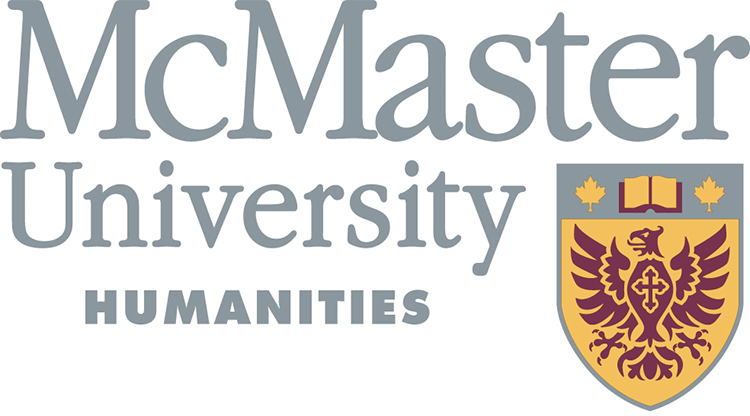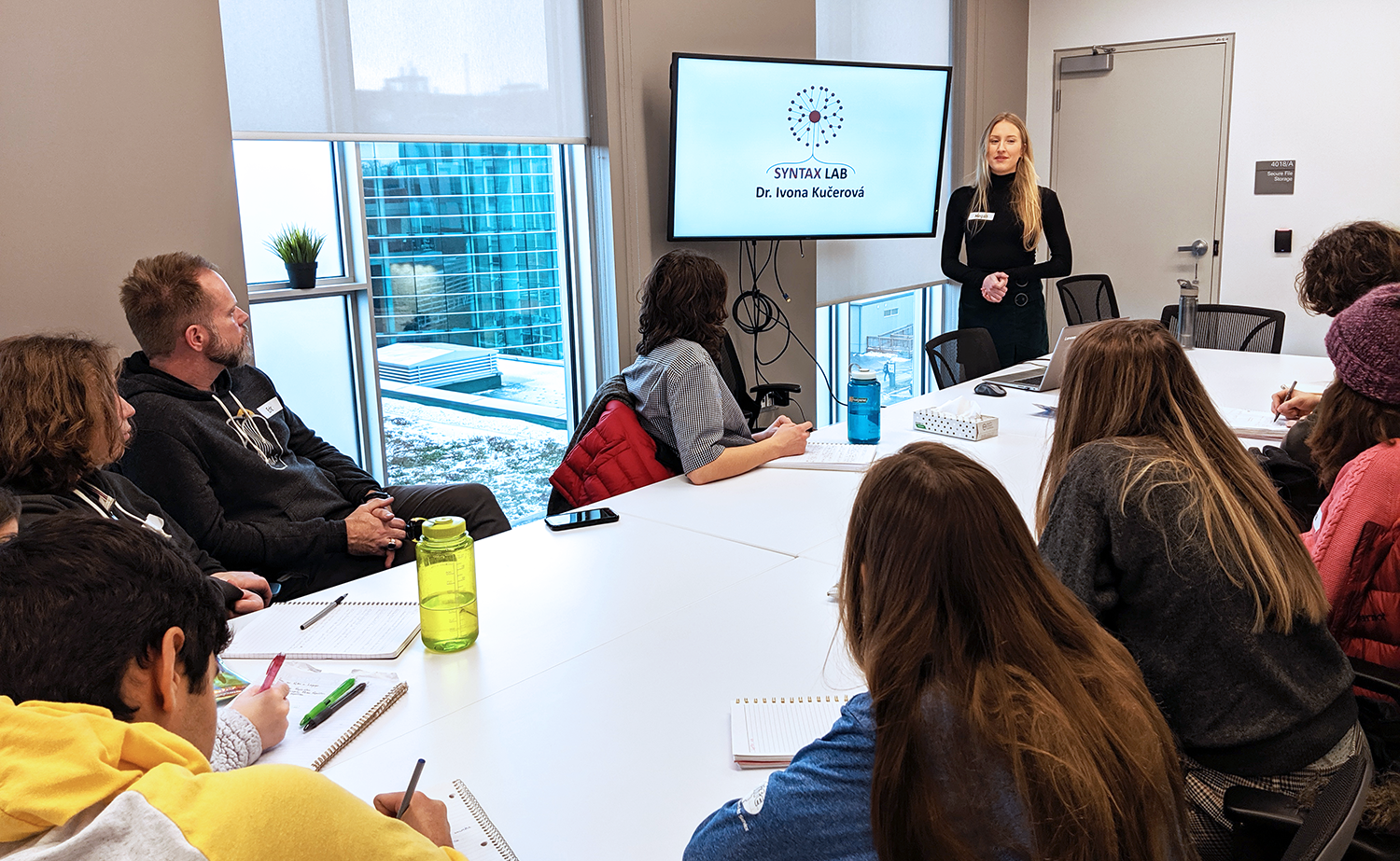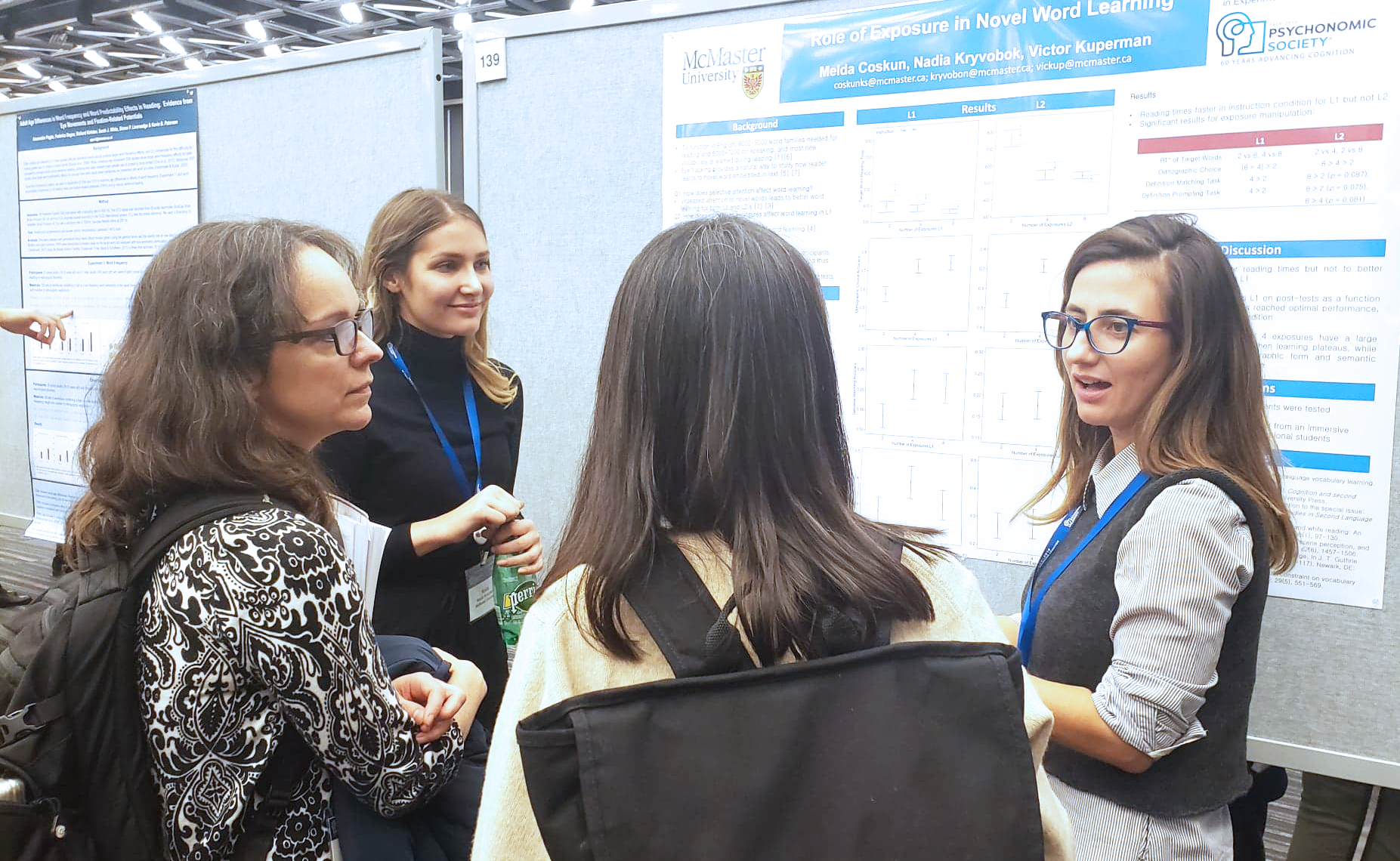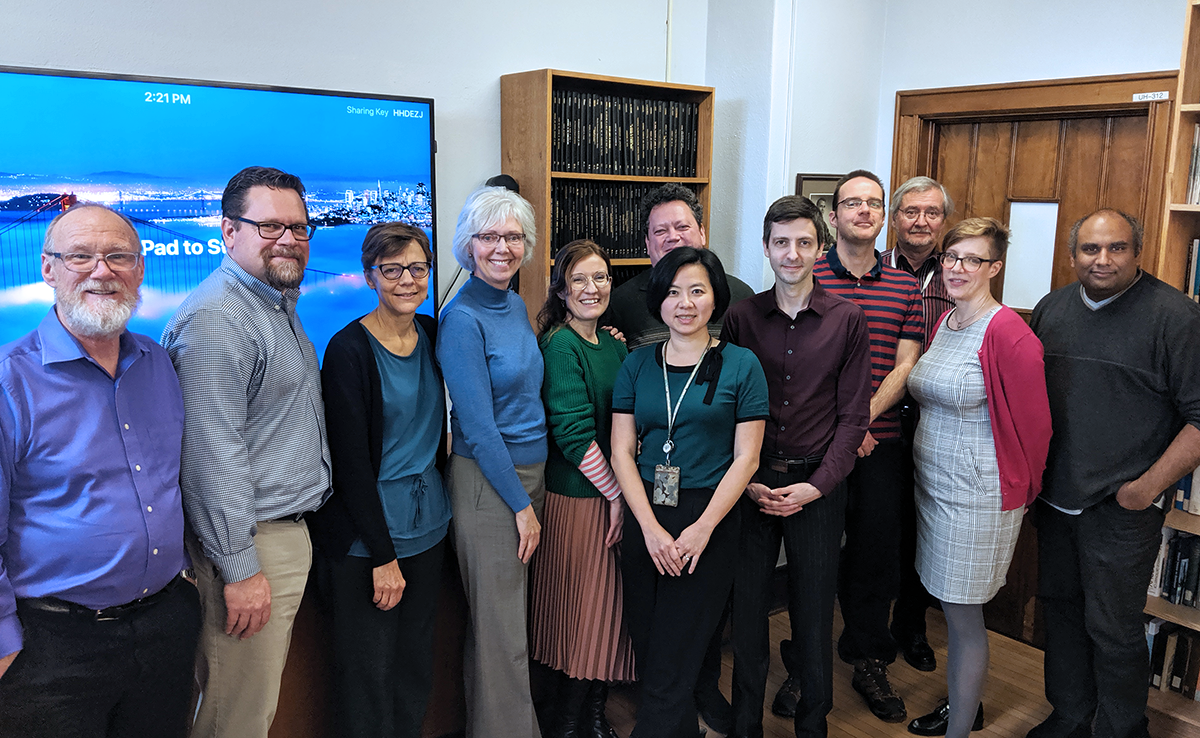ARiEAL
Annual Report 2019
Centre for Advanced Research in Experimental and Applied Linguistics
Message from the Director
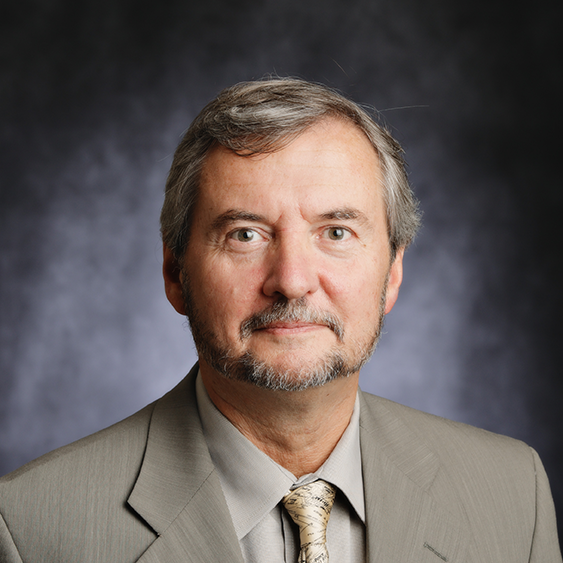
As the months closed in on the release of this 2019 annual report of ARiEAL, I had planned to write my message in a manner that was similar to previous years: in my office with the bustling labs in the background. Yet I sit here at home as our cat roams by my side questioning (i.e., tolerating) my excessive presence at home over the last few months. The world seems to have come to a stop because of the COVID-19 pandemic. It struck our community, affecting both our personal and professional lives. Program schedules, plans, and deadlines all took a massive detour, and responsibilities at home increased exponentially. What was supposed to be our busy data collection schedule is now replaced with remote data analysis and many (MANY) video-conferencing meetings since mid-March in 2020. Our students – at all academic levels – have had their programs and consequently their progress interrupted. However, as significant as these pandemic effects have been for us, they do pale when compared to the victims of this dangerous virus and to those front-line healthcare professionals and support staff who have not had the option of self-isolating. As well, there are the parents of young children who may be able to isolate themselves but worry that their child(ren) is now also isolated at what may be a critical point in their development. COVID-19 is a biologically, psychologically, and socially devastating virus whose consequences will be felt for years.
More recently, the death of George Floyd, Rayshard Brooks, and so many others have shocked and rightfully outraged civilized people around the world. These murders should elicit the urge in us to examine long-standing injustices that exist in our society and compel us to take serious action to make changes. Those of us old enough to remember the rebellions in Watts and many cities in the U.S. in 1964/5 cannot avoid the conclusion that while talk, public outrage, and marches seem promising at the time, things do not change unless other actions accompany them, as noted by many including Michael S. Render. Also, we cannot ignore and certainly should not deny the racism that exists in Canada. The problems in the U.S. are severe and dominate the headlines around the world, but the history of racism against the Indigenous people of Canada, for instance, is an outrage that has yet to be addressed properly. These racial and ethnic problems that exist globally have devastating consequences in the domains of education, physical health, employment, and mental health. It is unconscionable not to do whatever we can personally, but also within the context of the ARiEAL Research Centre, to address these systemic violations of human rights in our work in any way that we can. Symbolic gestures are just that….gestures. We must do more.
At ARiEAL, just as at McMaster University, we embrace diversity. Why would we not? We are demonstrably better for seeing, meeting, working, and collaborating with people with different backgrounds, cultures, and perspectives. As Founding Director of ARiEAL, I am proud that the Centre currently has about 23 languages spoken and comprises about 19 national origins (it varies annually with changes in personnel) and a range of ethnicities and colours. Of course, we denounce all forms of racism and vow to continue listening and learning as we contribute to mitigating racism and inequities wherever we encounter them. We acknowledge our privilege and commit to continuing to build a welcoming research community that values diversity and equity.
This annual report is for the year 2019. A year that was, for most of us, quieter and more stable than the year in which I write this statement. However, all of these problems existed in 2019. We must never forget that, while occasionally all of us experience significant adversity, for some of us that adversity is never occasional but rather an imposed lifestyle. That said, the Centre had an excellent 2019, which will now be reviewed.
The year 2019 marks the third calendar year since the ARiEAL Research Centre was founded. Following our previous success, this year did not fall short of that. High performance and increased impact through the Learning and Speaker Series brought us to an excellent state as we entered the last quarter. In November 2019, ARiEAL hosted the first video-conferencing meeting with its scientific advisory committee members, including Dr. Sylvain Baillet (McGill University), Dr. Laurie Feldman (University at Albany), Dr. Denise Klein (McGill University), Dr. Penny Pexman (University of Calgary), Dr. Ken Pugh (Haskins Laboratories), Dr. Sid Segalowitz (Brock University), and Dr. Jon Sprouse (University of Connecticut). Valuable advice regarding research strategic planning and the Centre’s operation was provided by these internationally-renowned researchers and have since inspired ongoing discussion within our core group.
In its third year of existence, ARiEAL Research Centre has built on its existing collaborations and developed new partnerships in the domestic and international research communities. Together, we started 15 new research grants as either Principal Investigators or Co-investigators in 2019, with funding totalling over 5.1 million dollars across these newly-initiated projects (see GRANTS Section of this annual report).
Trainees are the foundation of ARiEAL and often the strongest driving force behind various research projects. In 2019, we are proud to announce the launch of the ARiEAL Research Supplement Program to support our trainees. Projects that would otherwise go unfunded and trainees that may not have had the chance to pursue a research project of interest are afforded the chance to do so through this program. The novelty and breadth of research supported by this program has often served as a seed for future projects. Specifically, these small but mighty projects often offer the much-needed pilot data for larger-scale projects in the future.
ARiEAL’s online presence is progressively attracting attention. In 2019 alone, our website (https://arieal.mcmaster.ca/) welcomed over 7,000 visitors from 92 countries. Our official Twitter account (@ARiEAL_Research) reached over 150,000 impressions with 365 tweets/retweets and exceeded 4,200 engagement counts. We also started an Instagram account (@ariealrc) with the encouragement from the youth that participated in our 2019 youth outreach activities (see IMPACT Section of this annual report).
This 2019 annual report documents our interim productivity as we continue to strengthen the foundation of ARiEAL. We hope that our report may offer reassurance and support as our research community navigates through the uncharted territories caused by COVID-19. Further, we want to take this opportunity to remind ourselves of our collective commitment to create a safer and more equitable research environment at the Centre.
Sincerely,
Dr. John Connolly
Director, ARiEAL Research Centre
Professor, Department of Linguistics and Languages
Senator William McMaster Chair in the Cognitive Neuroscience of Language
Message from the Director
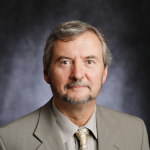 As the months closed in on the release of this 2019 annual report of ARiEAL, I had planned to write my message in a manner that was similar to previous years: in my office with the bustling labs in the background. Yet I sit here at home as our cat roams by my side questioning (i.e., tolerating) my excessive presence at home over the last few months. The world seems to have come to a stop because of the COVID-19 pandemic. It struck our community, affecting both our personal and professional lives. Program schedules, plans, and deadlines all took a massive detour, and responsibilities at home increased exponentially. What was supposed to be our busy data collection schedule is now replaced with remote data analysis and many (MANY) video-conferencing meetings since mid-March in 2020. Our students – at all academic levels – have had their programs and consequently their progress interrupted. However, as significant as these pandemic effects have been for us, they do pale when compared to the victims of this dangerous virus and to those front-line healthcare professionals and support staff who have not had the option of self-isolating. As well, there are the parents of young children who may be able to isolate themselves but worry that their child(ren) is now also isolated at what may be a critical point in their development. COVID-19 is a biologically, psychologically, and socially devastating virus whose consequences will be felt for years.
As the months closed in on the release of this 2019 annual report of ARiEAL, I had planned to write my message in a manner that was similar to previous years: in my office with the bustling labs in the background. Yet I sit here at home as our cat roams by my side questioning (i.e., tolerating) my excessive presence at home over the last few months. The world seems to have come to a stop because of the COVID-19 pandemic. It struck our community, affecting both our personal and professional lives. Program schedules, plans, and deadlines all took a massive detour, and responsibilities at home increased exponentially. What was supposed to be our busy data collection schedule is now replaced with remote data analysis and many (MANY) video-conferencing meetings since mid-March in 2020. Our students – at all academic levels – have had their programs and consequently their progress interrupted. However, as significant as these pandemic effects have been for us, they do pale when compared to the victims of this dangerous virus and to those front-line healthcare professionals and support staff who have not had the option of self-isolating. As well, there are the parents of young children who may be able to isolate themselves but worry that their child(ren) is now also isolated at what may be a critical point in their development. COVID-19 is a biologically, psychologically, and socially devastating virus whose consequences will be felt for years.
More recently, the death of George Floyd, Rayshard Brooks, and so many others have shocked and rightfully outraged civilized people around the world. These murders should elicit the urge in us to examine long-standing injustices that exist in our society and compel us to take serious action to make changes. Those of us old enough to remember the rebellions in Watts and many cities in the U.S. in 1964/5 cannot avoid the conclusion that while talk, public outrage, and marches seem promising at the time, things do not change unless other actions accompany them, as noted by many including Michael S. Render. Also, we cannot ignore and certainly should not deny the racism that exists in Canada. The problems in the U.S. are severe and dominate the headlines around the world, but the history of racism against the Indigenous people of Canada, for instance, is an outrage that has yet to be addressed properly. These racial and ethnic problems that exist globally have devastating consequences in the domains of education, physical health, employment, and mental health. It is unconscionable not to do whatever we can personally, but also within the context of the ARiEAL Research Centre, to address these systemic violations of human rights in our work in any way that we can. Symbolic gestures are just that….gestures. We must do more.
At ARiEAL, just as at McMaster University, we embrace diversity. Why would we not? We are demonstrably better for seeing, meeting, working, and collaborating with people with different backgrounds, cultures, and perspectives. As Founding Director of ARiEAL, I am proud that the Centre currently has about 23 languages spoken and comprises about 19 national origins (it varies annually with changes in personnel) and a range of ethnicities and colours. Of course, we denounce all forms of racism and vow to continue listening and learning as we contribute to mitigating racism and inequities wherever we encounter them. We acknowledge our privilege and commit to continuing to build a welcoming research community that values diversity and equity.
This annual report is for the year 2019. A year that was, for most of us, quieter and more stable than the year in which I write this statement. However, all of these problems existed in 2019. We must never forget that while occasionally all of us experience significant adversity, for some of us that adversity is never occasional but rather an imposed lifestyle. That said, the Centre had an excellent 2019, which will now be reviewed.
The year 2019 marks the third calendar year since the ARiEAL Research Centre was founded. Following our previous success, this year did not fall short of that. High performance and increased impact through the Learning and Speaker Series brought us to an excellent state as we entered the last quarter. In November 2019, ARiEAL hosted the first video-conferencing meeting with its scientific advisory committee members, including Dr. Sylvain Baillet (McGill University), Dr. Laurie Feldman (University at Albany), Dr. Denise Klein (McGill University), Dr. Penny Pexman (University of Calgary), Dr. Ken Pugh (Haskins Laboratories), Dr. Sid Segalowitz (Brock University), and Dr. Jon Sprouse (University of Connecticut). Valuable advice regarding research strategic planning and the Centre’s operation was provided by these internationally-renowned researchers and have since inspired ongoing discussion within our core group.
In its third year of existence, ARiEAL Research Centre has built on its existing collaborations and developed new partnerships in the domestic and international research communities. Together, we started 15 new research grants as either Principal Investigators or Co-investigators in 2019, with funding totaling over 5.1 million dollars across these newly-initiated projects (see GRANTS Section of this annual report).
Trainees are the foundation of ARiEAL and often the strongest driving force behind various research projects. In 2019, we are proud to announce the launch of the ARiEAL Research Supplement Program to support our trainees. Projects that would otherwise go unfunded and trainees that may not have had the chance to pursue a research project of interest are afforded the chance to do so through this program. The novelty and breadth of research supported by this program has often served as a seed for future projects. Specifically, these small but mighty projects often offer the much-needed pilot data for larger-scale projects in the future.
ARiEAL’s online presence is progressively attracting attention. In 2019 alone, our website (https://arieal.mcmaster.ca/) welcomed over 7,000 visitors from 92 countries. Our official Twitter account (@ARiEAL_Research) reached over 150,000 impressions with 365 tweets/retweets and exceeded 4,200 engagement counts. We also started an Instagram account (@ariealrc) with the encouragement from the youth that participated in our 2019 youth outreach activities (see IMPACT Section of this annual report).
This 2019 annual report documents our interim productivity as we continue to strengthen the foundation of ARiEAL. We hope that our report may offer reassurance and support as our research community navigates through the uncharted territories caused by COVID-19. Further, we want to take this opportunity to remind ourselves of our collective commitment to create a safer and more equitable research environment at the Centre.
Sincerely,
Dr. John Connolly
Director, ARiEAL Research Centre
Professor, Department of Linguistics and Languages
Senator William McMaster Chair in the Cognitive Neuroscience of Language
Research Highlights
The breadth of ARiEAL membership greatly reflects its interdisciplinarity. It is our ultimate goal to move away from the traditional silos to form a truly collaborative environment. Together, our research leads to an advanced understanding of the neural, behavioural, and social foundations of human communication. Highlighted below are the 2019 research activities from each of the laboratories led by ARiEAL researchers.
- Language, Memory and Brain Lab - EEG
- MELD Programs
- Teaching and Learning Lab
- Neurotechnology & Neuroplasticity Lab
- Language, Reading and Cognitive Neuroscience Lab
- The Syntax Lab
- The Reading Lab
- Imaging Research Centre
- The Phonetics Lab
- The Reilly Lab
- Language, Memory and Brain Lab - Behavioural
- The Turkstra Lab
- The Language and Working Memory Lab
- The MTBI Research Program
- The Performance Science Lab
Language, Memory and Brain Lab – EEG
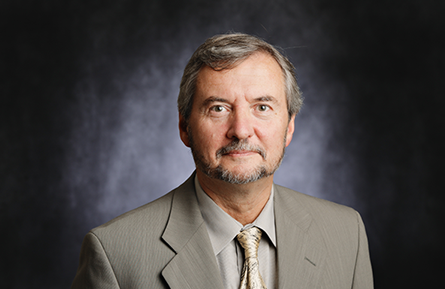
Co-director of the Language, Memory and Brain Lab, Dr. John Connolly. (Photo Credit: Ron Scheffler)
The Language, Memory and Brain (LMB) Lab is co-directed by Drs. John Connolly & Elisabet Service. Dr. Connolly’s research focuses on using brain recording/imaging (e.g., electroencephalogram [EEG]) to investigate a range of neurocognitive phenomena and their pathologies including attention, memory, and language processing and the effects of brain injury and recovery in conditions from coma to concussion. In 2019, two students, Rober Boshra (co-supervised with Dr. Jim Reilly) and Kyle Ruiter, successfully completed their doctoral degrees. Collaborating with other ARiEAL members, Drs. Jim Reilly and Ranil Sonnadara, Dr. Connolly received funding from a Collaborative Health Research Projects grant from Canadian Institutes of Health Research and Natural Sciences and Engineering Research Council back in 2018 for their research project on the development of a point of care system for automated coma prognosis. The data collection for the coma project has been underway at Hamilton General Hospital in 2019 and continues in 2020. In collaboration with other ARiEAL members, Dr. Connolly published several papers including one on the detection of concussion using machine learning techniques and another on the coma study protocol, which appeared in IEEE Transactions on Neural Systems and Rehabilitation Engineering and BMJ Open, respectively.
MELD Programs & The MELD Bilingualism Lab
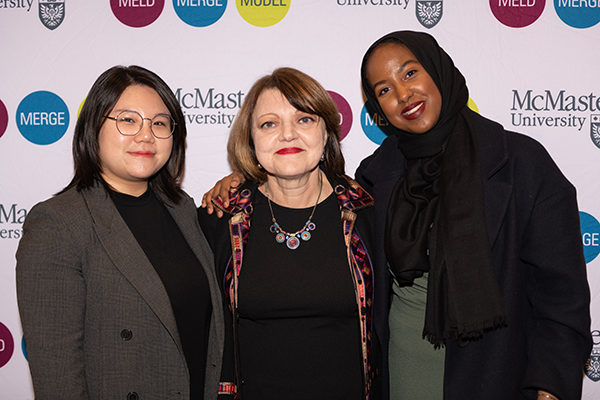
Associate Director of the ARiEAL Research Centre and Director of MELD programs and the Bilingualism Lab, Dr. Anna Moro (centre). Photographed together with Rita Jiang, Communications Associate of MELD Programs (left) and Yasmin Mohamed, Instructional Assistant of MELD Programs(right). (Photo Credit: Angela Herring-Lauzon)
The McMaster English Language Development (MELD) Programs and the MELD Bilingualism Lab are both directed by Dr. Anna Moro. MELD programs are intended for international students whose primary language is not English but who wish to improve their English proficiency to succeed in an English-speaking higher education environment. Since 2018, MELD Programs have expanded their services from the MELD Diploma to also include McMaster English Readiness for Graduate Excellence (MERGE) and McMaster Office for the Development of English Language Learners (MODEL) to offer an even more comprehensive range of services to international students of all levels. In 2019, the MELD program established a number of Community Awards aimed at supporting members of the broader Hamilton community who could benefit from participating in an intensive language and culture program. The Awards program, which covers all tuition and supplementary fees, welcomed 9 recipients in 2019.
The Bilingualism Lab investigates the underlying linguistic mechanisms of bilingual phenomena and focuses on second language development. While MELD Programs are not a research laboratory per se, interesting research on foreign language acquisition is being conducted on a regular basis with the support and guidance of the Bilingualism Lab. In March and April 2019, the MELD research team led by Dr. Moro and her postdoctoral fellow, Dr. Daniel Schmidtke, continued their eye-tracking experiments and language skills testing with their 2018-2019 student cohort. The results were compared to the data collected in the previous year to examine changes in performance and outcomes. The testing procedure was expanded and implemented again with the 2019-2020 student cohort of 485. The continuity of these research activities aims to bring regular and reliable improvement to the MELD programs, as well as to contribute to our understanding of certain mechanisms underlying second language development. Lessons learned from the program and research models behind the MELD program were presented in November at the annual conference of the Canadian Bureau for International Education. Last but not least, Dr. Moro was awarded with the YWCA Woman of Distinction Award for Education/Mentorship in 2019.
Teaching and Learning Lab
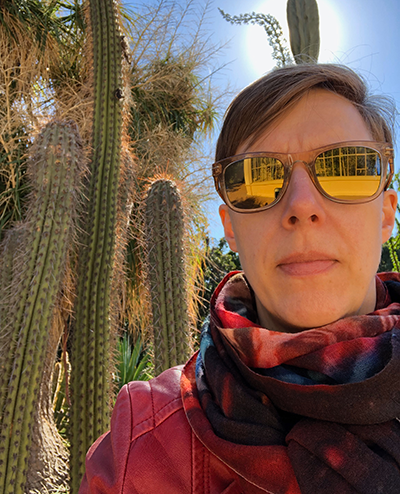
Dr. Anderson, Director of the Teaching and Learning Lab, making friends at the Adelaide Botanic Garden in South Australia. (Photo Credit: Dr. Catherine Anderson)
Dr. Catherine Anderson, an Associate Professor in the Department of Linguistics and Languages, directs the Teaching and Learning Lab. The lab’s research, all of which is conducted in collaboration with undergraduate student partners, focuses on students’ experiences in a variety of undergraduate learning contexts. In 2019, Dr. Anderson and her student partner, Paige McKenny, disseminated their experiences on conducting an academic program review with student partners in the International Journal of Students as Partners. Together, they joined colleagues from University College London and the University of Adelaide to run the International Students as Partners Institute in Adelaide, Australia. In 2019, the lab initiated a new project funded through the Equity Stream of the Student Partners program, investigating the experiences of minoritized students in active-learning classrooms. Dr. Anderson also collaborated with a team of scholars from across Ontario to offer workshops on experimentation in teaching at the Technology and Education Seminar and Showcase 2019 Symposium. Dr. Anderson’s book, Essentials of Linguistics, was the first selection in the Linguistics Basics Book Club run by the hosts of the widely-acclaimed Lingthusiasm podcast.
Neurotechnology & Neuroplasticity Lab
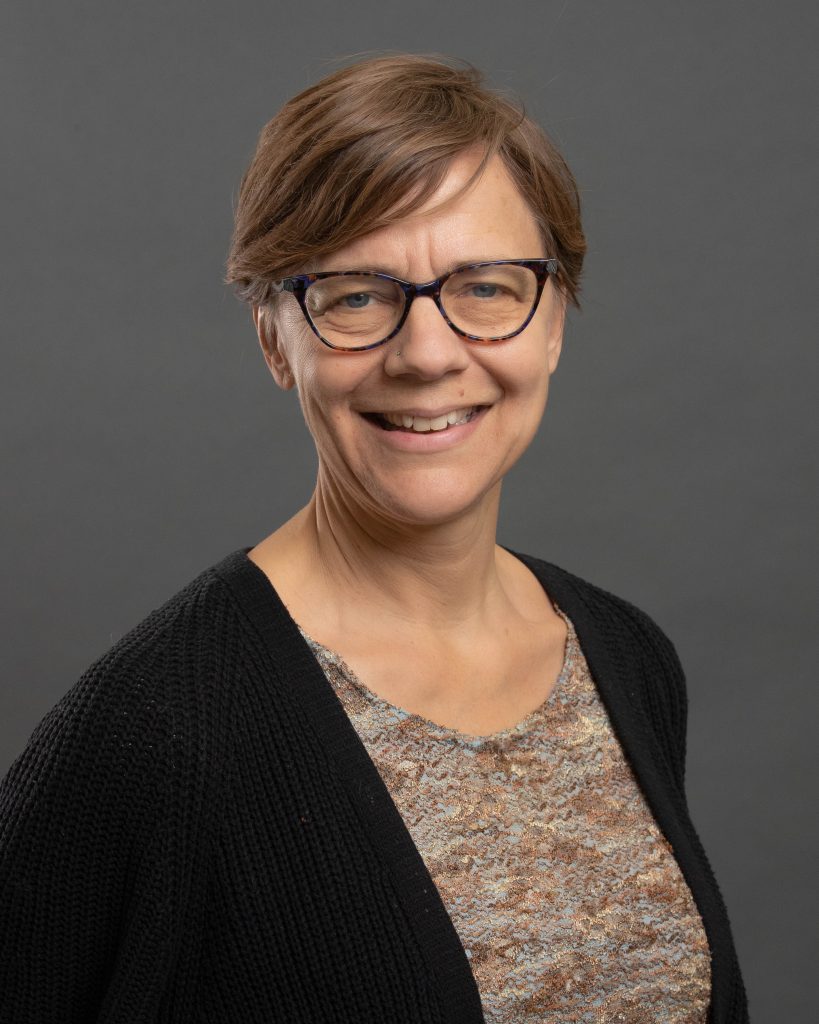
Director of the the Neurotechnology & Neuroplasticity Lab, Dr. Sue Becker. (Photo Credit: Georgia Kirkos)
The Neurotechnology & Neuroplasticity Lab is directed by Dr. Sue Becker whose research focuses on the neural bases of learning and memory. The Neurotechnology & Neuroplasticity Lab employs a variety of methodologies including computational modelling and behavioural and neuroimaging studies to investigate questions such as how the hippocampus codes episodic and spatial memories, the role of neurogenesis in memory and mood regulation, and how stress, binge drinking, exercise, and neurofeedback affect hippocampal memory functions and intrinsic brain networks. Applications of this research include the development of novel algorithms for EEG-based neurofeedback and brain-computer interfaces. In 2019, several new trainees started at the Neurotechnology & Neuroplasticity Lab, including master’s students, Deewa Anwarzi (co-supervised with Dr. Sukhvinder Obhi) and Leila Mousapour (co-supervised with Dr. John Connolly), and Mohammad Chaposhloo in the doctoral program. Dr. Becker also received a Discovery Grant from Natural Sciences and Engineering Research Council for her research investigating the role of the medial temporal lobe memory system in regulating behaviour. Members of Dr. Becker’s lab disseminated their research findings at various local and national conferences, including the Annual Meeting of the Memory Disorders Research Society, and published their findings on the impact of running programs on complex mood disorders in BMJ Open Sport & Exercise Medicine and the inadequacy of microstates for characterizing EEG dynamics in Neural Computation.
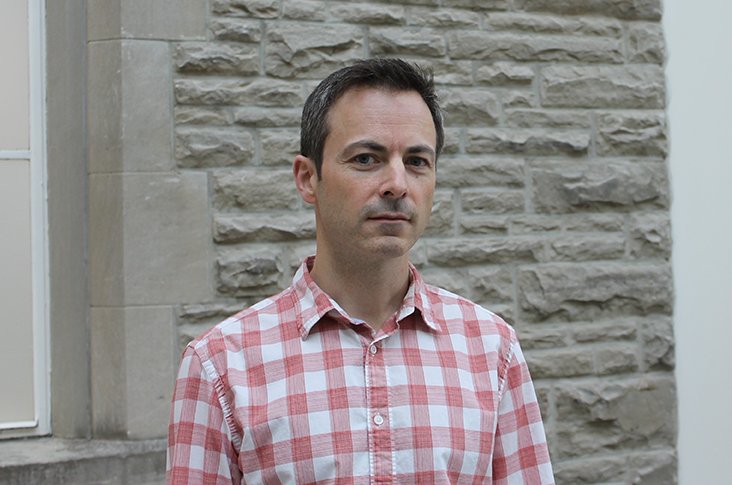
Director of the Language, Reading and Cognitive Neuroscience Lab, Dr. Marc Joanisse. (Photo provided by Dr. Marc Joanisse)
The Syntax Lab
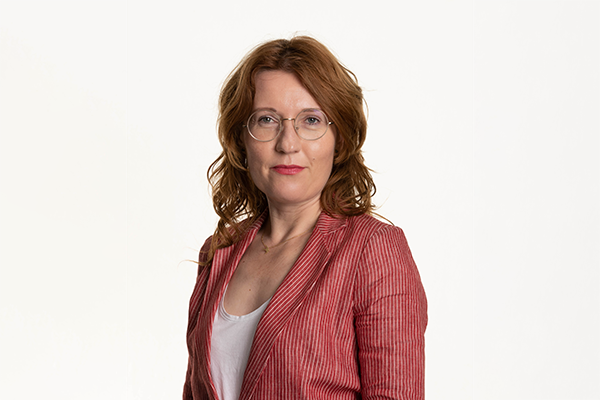
Director of the Syntax Lab, Dr. Ivona Kučerová. (Photo Credit: Georgia Kirkos)
The Syntax Lab, directed by Dr. Ivona Kučerová, investigates syntactic structures, including combinatorial properties of natural languages from the general-cognition perspective. Both traditional fieldwork and experimental methods are used to collect data from cross-linguistically diverse languages, including Indigenous languages of Canada. The goal of this research is to identify and model universal and language-specific structural properties of human languages. The primary focus of the work currently conducted in the Syntax Lab is on modelling features at the syntax-semantics interface. In 2019, Frederico Prado completed his master’s degree and has continued on with the doctoral training with Dr. Kučerová. In addition, the Syntax Lab welcomed three new trainees in 2019: Megan Karabin and Kurtis Commanda to start their master’s training and Aya Zarka from Israel as a visiting student. The Syntax Lab also received funding from the Canada Foundation for Innovation for its infrastructure development, which supports the lab’s new experimental direction with the use of the electroencephalogram. Throughout 2019, Dr. Kučerová was invited to speak at various seminars and conferences across the world, including Ben Gurion University in Israel and New York University in the U.S.. Dr. Kučerová published two long-form journal articles (Canadian Journal of Linguistics, The Linguistics Review) and a book chapter for Oxford University Press with her former trainee, Dr. Jitka Bartošová.
The Reading Lab
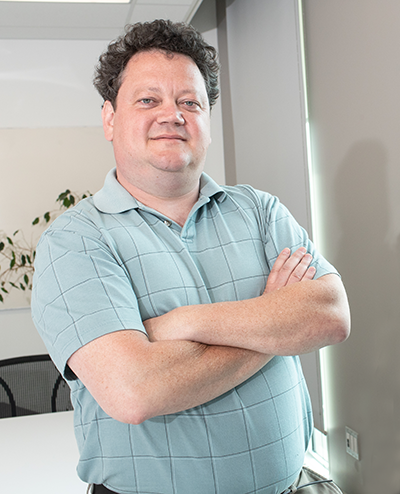
Director of the Reading Lab, Dr. Victor Kuperman. (Photo Credit: JD Howell)
The Reading Lab, directed by Dr. Victor Kuperman, targets a range of areas in psycholinguistics and corpus linguistics. More specifically, the Reading Lab focuses on the visuo-oculomotor and cognitive predictors of reading, the processing of printed morphologically complex words, and the effects of emotion on language production and comprehension. Eye-tracking is the key research paradigm at the Reading Lab. In 2019, Constance Imbault and Bryor Snefjella completed their doctoral degrees, and Davide Gentile completed his master’s degree. Members of the Reading Lab had a successful year presenting their work at various national and international conferences including the 60th Annual Meeting of Psychonomics and 20th European Conference on Eye Movements. Lab members also published their work in a number of prestigious journals, including Scientific Studies of Reading, Language, Cognition and Neuroscience and Cortex. Through Dr. Kuperman’s collaboration with “Words in the World (WoW),” a Social Sciences and Humanities Research Council (SSHRC) Partnered Research Training Initiative, the Reading Lab continues to host many researchers from around the world, such as Dr. Athanassios Protopapas from University of Oslo in Norway, Dr. Johanna Kaakinen from University of Turku in Finland, and Dr. Noam Siegelman from Yale University in the U.S. Members of the lab were successful in attracting research funding from the SSHRC Insight Development grant (PI Kyrolainen, postdoctoral fellow at the Reading Lab), AGE-WELL grant, and McMaster Institute for Research on Aging Catalyst grant (PI Kuperman); doctoral and master students were also awarded SSHRC fellowships and Ontario Graduate Scholarships.
Imaging Research Centre
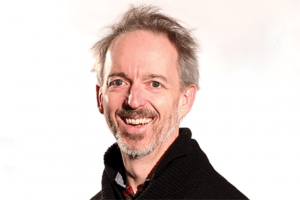
Director of the Imaging Research Centre, Dr. Michael Noseworthy.
Dr. Michael Noseworthy is the director of Medical Imaging Physics and Engineering at the Imaging Research Centre at St. Joseph’s Healthcare, Hamilton. By providing the research community with access to imaging technology (including a GE Healthcare 3T Discovery MR7503T MRI scanner with 32 receiver channels and multinuclear imaging capabilities (31P, 23Na, 129Xe, 19F, 13C), a Polareon xenon polarizer, and a brand new GE Discovery MI 128 slice PET/CT scanner), efforts from Dr. Noseworthy and his group have played an integral role in advancing imaging research. Much of his work focuses on novel MRI sequence and hardware development. Recently, however, he was awarded an Idea to Innovation (i2i) Grant from the Natural Sciences and Engineering Research Council to support his work on developing MRI data algorithms for assessing mild traumatic brain injury. Additionally, he was the engineering co-PI on a Collaborative Health Research Projects grant awarded for developing a concussion management smart-phone app, which, in combination with machine learning, provides real-time patient feedback. Dr. Noseworthy was also invited by the Canadian Association for Medical Radiation Technologists Game Changers Future Technologies Summit and Institut für Radiologie & Nuklearmedizin in Switzerland to share his expertise in AI and MRI applications. Members of his team participated in a number of conferences during 2019, including the European Society for Magnetic Resonance in Medicine and Biology (ESMRMB) in Rotterdam, The Netherlands and the International Society for Magnetic Resonance in Medicine (ISMRM) in Montreal, Canada. Their work was also published in several highly regarded journals, including Magnetic Resonance in Medicine (MRM), Magnetic Resonance Imaging (MRI), Radiology, Frontiers and Ageing Neuroscience, and European Heart Journal – Cardiovascular Imaging.
The Phonetics Lab
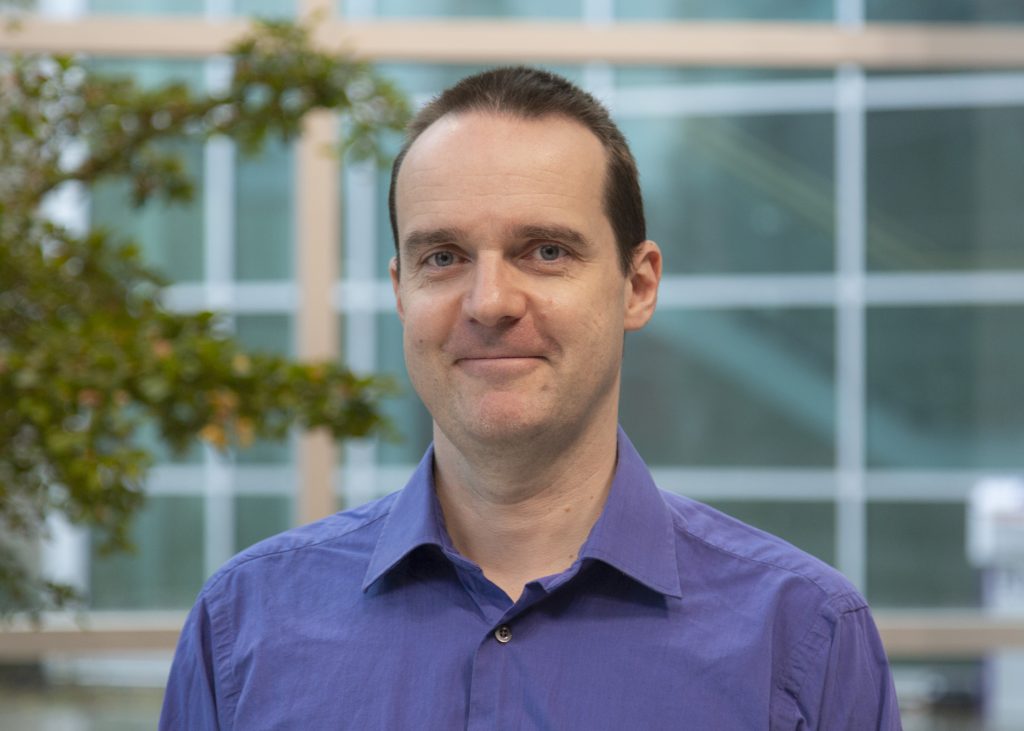
Director of the Phonetics Lab, Dr. Daniel Pape. (Photo Credit: Colin Czerneda)
Under the direction of Dr. Daniel Pape, the Phonetics Lab is dedicated to investigating experimental phonetics, the link between speech production and speech perception, and the relationship between phonetics and neurolinguistics. More specifically, the research at the Phonetics Lab examines the use and interplay of acoustic cues (i.e., cue-weighting) for: 1) speech production and perception and 2) articulatory and biomechanical constraints in speech perception. In 2019, as Olivier Mercier successfully completed his master’s degree, the Phonetics Lab welcomed two new master’s students: Carla Weigel (co-supervised with Dr. Magda Stroinska) and Kurtis Commanda (co-supervised with Dr. Ivona Kučerová). Dr. Pape’s experimental research stream examining the importance and interplay of several acoustic cues on the production and perception of lexical stress and focus continued in 2019. Members of the Phonetics Lab presented their research at conferences such as the International Conference of Phonetic Sciences in Melbourne, Australia and Phonetics and Phonology in Europe in Lecce, Italy and published full papers in peer-reviewed journals such as Speech Communication.
The Reilly Lab
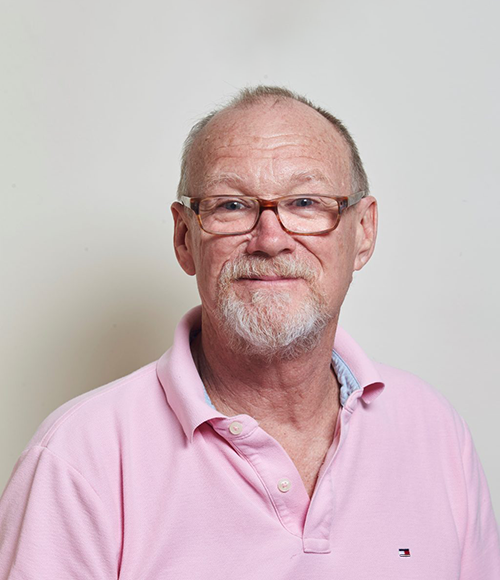
Director of the Reilly Lab, Dr. Jim Reilly. (Photo provided by Dr. Jim Reilly)
Dr. Jim Reilly works at the interface of machine learning and signal processing applied to health-related problems, particularly in neuroscience and psychiatry. Specific projects in this area include the development of improved machine learning algorithms, diagnosis and treatment of psychiatric illness, assessing prognosis for coma outcome, and assessment of infant motor movement relating to neurological deficit. Dr. Reilly officially retired in 2019 and has since assumed the rank of Professor Emeritus at McMaster University. Dr. Reilly continues to maintain an active research profile since his retirement. Research conducted at the Reilly Lab was disseminated in manuscripts published in reputable journals including: Scientific Reports, IEEE Transactions on Neural Networks and Learning Systems, IEEE Transactions on Neural Systems and Rehabilitation Engineering, and IEEE Journal of Biomedical and Health Informatics. Dr. Reilly also presented at the 41st International Engineering in Medicine and Biology Conference in Berlin, Germany.
Language, Memory and Brain Lab – Behavioural
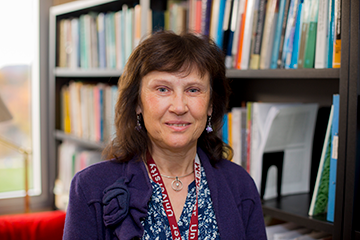
Co-director of the Language, Memory and Brain Lab, Dr. Elisabet Service. (Photo Credit: Colin Czerneda)
The Language, Memory and Brain (LMB) Lab is co-directed by Drs. John Connolly & Elisabet Service. Dr. Service conducts research using behavioural measures to investigate topics including basic research on language acquisition, spoken word processing, working memory, and other related cognitive processes. Much of this work is then applied in investigations of language disorders including dyslexia. Dr. Service and her research partners in Finland published a study protocol on the Helsinki longitudinal specific language impairment project in BMC Psychology back in 2018. Since then, she has adopted the cognitive part of the protocol in Canada with her trainees, Angie Lopez and Erin DeBorba. Dr. Service’s study on the effects of second language use on performance of work-like tasks continues in 2019, and expansion of the study is in the planning phase. Dr. Service disseminated her research findings in a book chapter on dyslexia, as well as at various local and national conferences including annual meetings of the Canadian Society for Brain, Behaviour and Cognitive Science and The Psychonomic Society.
The Turkstra Lab
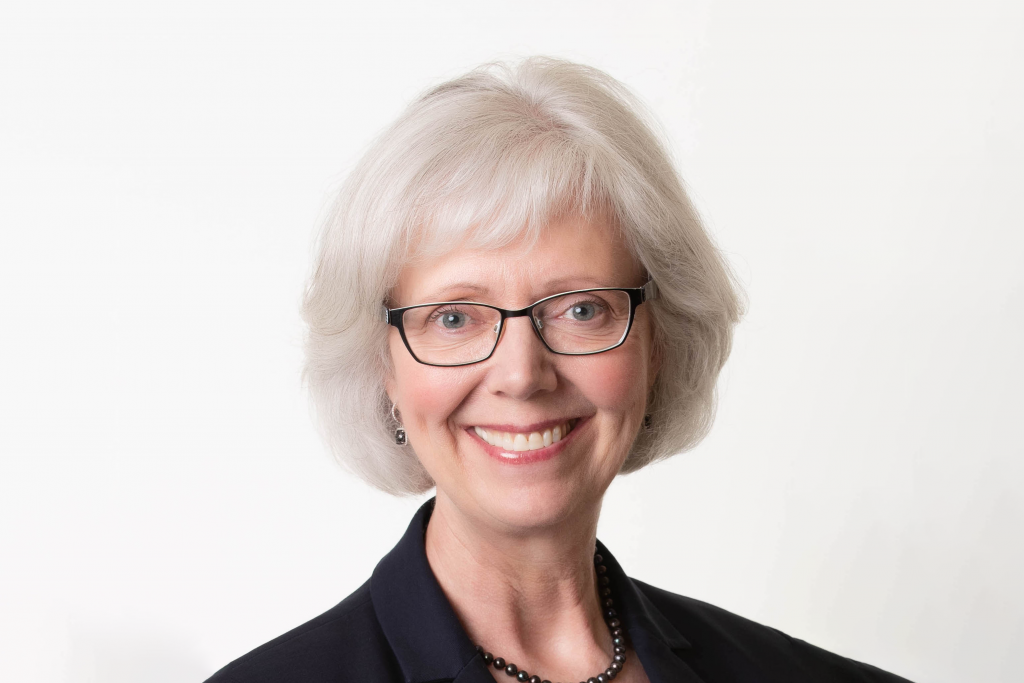
Director of the Turkstra Lab, Dr. Lyn Turkstra. (Photo Credit: Georgia Kirkos)
Dr. Lyn Turkstra’s research examines links between cognitive function and social communication in individuals with traumatic brain injury (TBI), with the goal of improving clinical practice and long-term patient outcomes. In 2019, together with Drs. Bilge Mutlu and Melissa Duff (co-PIs), Dr. Turkstra (co-investigator) received funding from the National Institutes of Health in the U.S. to design social media and other computer-mediated communication to support social participation in adults with TBI. Members of the Turkstra Lab disseminated their research through 16 manuscripts in highly regarded journals, such as Brain Injury, Journal of Head Trauma Research, and Archives of Physical Medicine and Rehabilitation, in 2019 alone. Dr. Turkstra is a co-investigator on a clinical trial of cognitive rehabilitation for active duty service members and veterans with mild TBI, in the U.S., funded by the U.S. Department of Defense. This study aims to implement a streamlined version of an individualized cognitive rehabilitation program previously validated in this clinical population. In 2019, the lab concluded a collaborative study with Drs. Sheila Sprague and Mohit Bhandari in the McMaster Orthopaedic Surgery Department to determine the prevalence of TBI and intimate partner violence among female patients. Dr. Turkstra and her team also presented their research findings at the 13th World Congress on Brain Injury that was hosted by the International Brain Injury Association.
The Language and Working Memory Lab
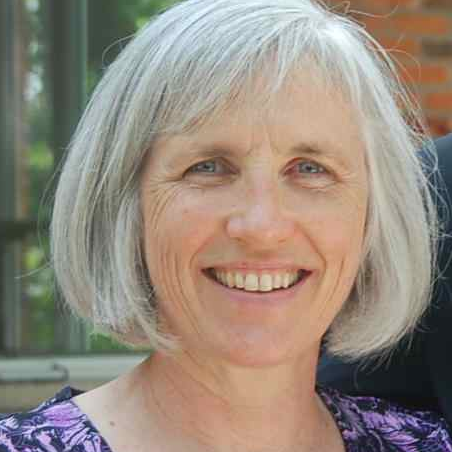
Director of the Language and Working Memory Lab, Dr. Lisa Archibald. (Photo provided by Dr. Lisa Archibald)
The Language and Working Memory Lab is directed by Dr. Lisa Archibald and is part of the School of Communication Sciences and Disorders at The University of Western Ontario. The Language and Working Memory Lab focuses on investigating how language and memory processes interact in both children learning at a typical rate and those with learning disabilities. In 2019, Dr. Archibald and her colleague contributed to The SAGE encyclopedia of Human Communication Sciences and Disorders with their chapter on collaboration in speech-language therapy. Members of the Language and Working Memory Lab also published widely on developmental language disorder in reputable journals, such as Frontiers in Young Minds and Language, Speech, and Hearing Services in Schools. A total of 18 presentations were presented at various conferences in 2019, including Symposium on Research in Child Language Disorders in the U.S., International Association of Logopediatrics & Phoniatrics Convention in Taiwan, and Annual Meeting of the Society for Neurobiology of Language in Finland.
The MTBI Research Program
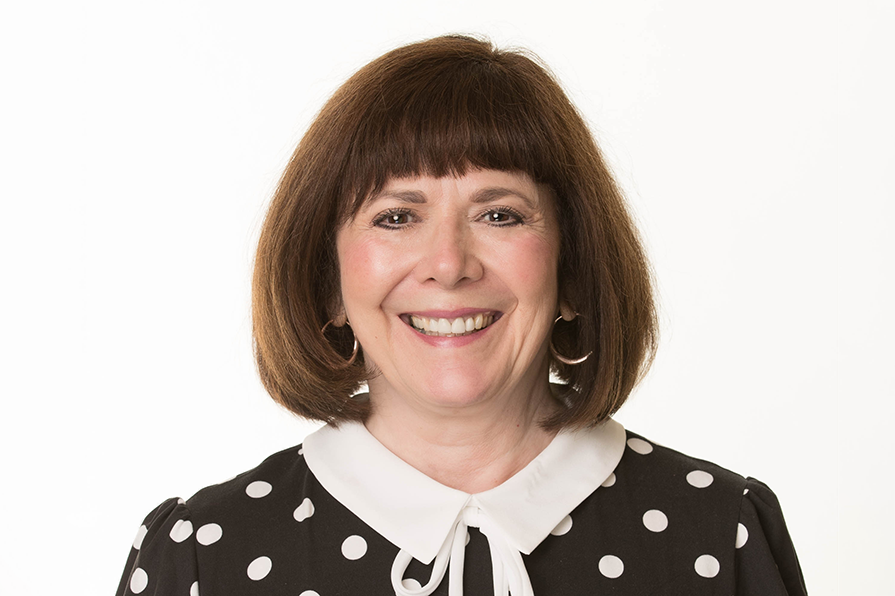
Director of The mTBI Research Program, Professor Carol DeMatteo. (Photo Credit: Georgia Kirkos)
As a clinician scientist, Professor Carol DeMatteo specializes in childhood neurotrauma, specifically acquired brain injury including concussion. She is based at CanChild Centre for Childhood Disability Research and the School of Rehabilitation Science. In 2019, Professor DeMatteo secured several grants including Canadian Institutes of Health Research Catalyst Grant for the Concussion Centre of Excellence (Canadian Concussion Network: Co-Investigator), Ontario Brain Institute Event Grant (Principle Investigator), as well as the Inglis Family Foundation Private Donor grant. Of note, Professor DeMatteo and her team (including ARiEAL researchers, Drs. Michael Noseworthy and John Connolly) received funding from Canadian Institutes of Health Research and Natural Sciences and Engineering Research Council for their Collaborative Health Research Projects Grant on the development of a concussion management platform (the Back2Play app) for children and youth. This project builds on Professor DeMatteo’s years of research in pediatric concussion and development of evidence-based Return to Activity (RTA) and Return to School (RTS) guidelines. Amidst ongoing development of the Back2Play app, Professor DeMatteo has published 11 peer-reviewed articles in 2019 alone. Professor DeMatteo and her team disseminated their findings on adherence to the RTA and RTS guidelines in Clinical Journal of Sport Medicine and on how these data informed revisions to the RTA and RTS guidelines in Clinical Pediatrics. More recently, she performed a systematic review, published in BMJ Open Sport and Exercise Medicine, to assess the effects of following the RTA and RTS guidelines on clinical outcomes in children. In addition to her research endeavours, Professor DeMatteo has been invited to provide her expertise on pediatric concussion such as the relationship between sleep quality and concussion recovery, which was presented at the 7th Annual Concussion Research Symposium in Toronto. Notably, Professor DeMatteo is currently supervising 3 MSc students and sits on the supervisory committee of 5 graduate students in programs ranging from Biomedical Engineering to Psychology, Neuroscience and Behaviour.
The Performance Science Lab
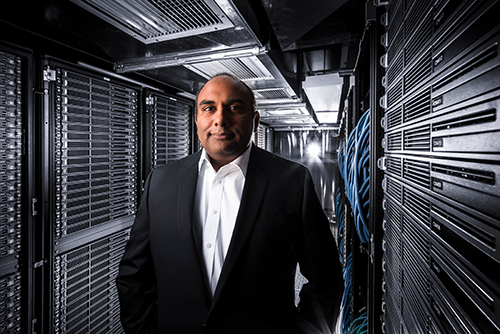
Director of the Performance Science Lab, Dr. Ranil Sonnadara. (Photo provided by Dr. Ranil Sonnadara)
The Performance Science Lab, directed by Dr. Ranil Sonnadara, studies the way people learn new skills. The lab is particularly interested in how information flow across the motor and perceptual systems changes with practice and how feedback and assessment can be effectively implemented to support skill acquisition. The lab also studies ways to optimize performance in high-stakes environments and how performance can be measured in meaningful ways. In 2019, Dr. Sonnadara and colleagues received funding from CANARIE, McMaster Institute for Research on Aging, and McMaster Surgical Associates Education Research Grant to investigate a wide range of interesting topics, including the Catalyst Grant. This grant was received in collaboration with ARiEAL researcher, Dr. Victor Kuperman, and focuses on identifying the linguistic markers of cognitive, emotional, and social well-being among older adults. Research conducted at the Performance Science Lab was presented at a number of distinguished conferences including the International Conference on Residency Education in Canada, the Annual Meeting of the Association for Surgical Education in the USA, and the Annual Conference of the Association for Medical Education in Europe in Austria. Dr. Sonnadara was also invited by Vector Institute to speak about “Understanding Performance” at their 2019 Postgraduate Affiliate Welcome Event.
- Language, Memory and Brain Lab - EEG
- MELD Programs
- Teaching and Learning Lab
- Neurotechnology & Neuroplasticity Lab
- Language, Reading and Cognitive Neuroscience Lab
- The Syntax Lab
- The Reading Lab
- Imaging Research Centre
- The Phonetics Lab
- The Reilly Lab
- Language, Memory and Brain Lab - Behavioural
- The Turkstra Lab
- The Language and Working Memory Lab
- The MTBI Research Program
- The Performance Science Lab
Language, Memory and Brain Lab – EEG
The Language, Memory and Brain (LMB) Lab is co-directed by Drs. John Connolly & Elisabet Service. Dr. Connolly’s research focuses on using brain recording/imaging (e.g., electroencephalogram [EEG]) to investigate a range of neurocognitive phenomena and their pathologies including attention, memory, and language processing and the effects of brain injury and recovery in conditions from coma to concussion. In 2019, two students, Rober Boshra (co-supervised with Dr. Jim Reilly) and Kyle Ruiter, successfully completed their doctoral degrees. Collaborating with other ARiEAL members, Drs. Jim Reilly and Ranil Sonnadara, Dr. Connolly received funding from a Collaborative Health Research Projects grant from Canadian Institutes of Health Research and Natural Sciences and Engineering Research Council back in 2018 for their research project on the development of a point of care system for automated coma prognosis. The data collection for the coma project has been underway at Hamilton General Hospital in 2019 and continues in 2020. In collaboration with other ARiEAL members, Dr. Connolly published several papers including one on the detection of concussion using machine learning techniques and another on the coma study protocol, which appeared in IEEE Transactions on Neural Systems and Rehabilitation Engineering and BMJ Open, respectively.
MELD Programs & The MELD Bilingualism Lab
The McMaster English Language Development (MELD) Programs and the MELD Bilingualism Lab are both directed by Dr. Anna Moro. MELD programs are intended for international students whose primary language is not English but who wish to improve their English proficiency to succeed in an English-speaking higher education environment. Since 2018, MELD Programs have expanded their services from the MELD Diploma to also include McMaster English Readiness for Graduate Excellence (MERGE) and McMaster Office for the Development of English Language Learners (MODEL) to offer an even more comprehensive range of services to international students of all levels. In 2019, the MELD program established a number of Community Awards aimed at supporting members of the broader Hamilton community who could benefit from participating in an intensive language and culture program. The Awards program, which covers all tuition and supplementary fees, welcomed 9 recipients in 2019.
The Bilingualism Lab investigates the underlying linguistic mechanisms of bilingual phenomena and focuses on second language development. While MELD Programs are not a research laboratory per se, interesting research on foreign language acquisition is being conducted on a regular basis with the support and guidance of the Bilingualism Lab. In March and April 2019, the MELD research team led by Dr. Moro and her postdoctoral fellow, Dr. Daniel Schmidtke, continued their eye-tracking experiments and language skills testing with their 2018-2019 student cohort. The results were compared to the data collected in the previous year to examine changes in performance and outcomes. The testing procedure was expanded and implemented again with the 2019-2020 student cohort of 485. The continuity of these research activities aims to bring regular and reliable improvement to the MELD programs, as well as to contribute to our understanding of certain mechanisms underlying second language development. Lessons learned from the program and research models behind the MELD program were presented in November at the annual conference of the Canadian Bureau for International Education. Last but not least, Dr. Moro was awarded with the YWCA Woman of Distinction Award for Education/Mentorship in 2019.
Teaching and Learning Lab
Dr. Catherine Anderson, an Associate Professor in the Department of Linguistics and Languages, directs the Teaching and Learning Lab. The lab’s research, all of which is conducted in collaboration with undergraduate student partners, focuses on students’ experiences in a variety of undergraduate learning contexts. In 2019, Dr. Anderson and her student partner, Paige McKenny, disseminated their experiences on conducting an academic program review with student partners in the International Journal of Students as Partners. Together, they joined colleagues from University College London and the University of Adelaide to run the International Students as Partners Institute in Adelaide, Australia. In 2019, the lab initiated a new project funded through the Equity Stream of the Student Partners program, investigating the experiences of minoritized students in active-learning classrooms. Dr. Anderson also collaborated with a team of scholars from across Ontario to offer workshops on experimentation in teaching at the Technology and Education Seminar and Showcase 2019 Symposium. Dr. Anderson’s book, Essentials of Linguistics, was the first selection in the Linguistics Basics Book Club run by the hosts of the widely-acclaimed Lingthusiasm podcast.
Neurotechnology & Neuroplasticity Lab
The Neurotechnology & Neuroplasticity Lab is directed by Dr. Sue Becker whose research focuses on the neural bases of learning and memory. The Neurotechnology & Neuroplasticity Lab employs a variety of methodologies including computational modelling and behavioural and neuroimaging studies to investigate questions such as how the hippocampus codes episodic and spatial memories, the role of neurogenesis in memory and mood regulation, and how stress, binge drinking, exercise, and neurofeedback affect hippocampal memory functions and intrinsic brain networks. Applications of this research include the development of novel algorithms for EEG-based neurofeedback and brain-computer interfaces. In 2019, several new trainees started at the Neurotechnology & Neuroplasticity Lab, including master’s students, Deewa Anwarzi (co-supervised with Dr. Sukhvinder Obhi) and Leila Mousapour (co-supervised with Dr. John Connolly), and Mohammad Chaposhloo in the doctoral program. Dr. Becker also received a Discovery Grant from Natural Sciences and Engineering Research Council for her research investigating the role of the medial temporal lobe memory system in regulating behaviour. Members of Dr. Becker’s lab disseminated their research findings at various local and national conferences, including the Annual Meeting of the Memory Disorders Research Society, and published their findings on the impact of running programs on complex mood disorders in BMJ Open Sport & Exercise Medicine and the inadequacy of microstates for characterizing EEG dynamics in Neural Computation.
Language, Reading and Cognitive Neuroscience Lab
The Language, Reading and Cognitive Neuroscience Lab is directed by Dr. Marc Joanisse and is housed in The University of Western Ontario’s Brain and Mind Institute. Dr. Joanisse’s lab examines the cognitive and neural foundations of language and reading across the lifespan. This includes studying reading and language disorders in children, as well as language learning and processing in adults. Commonly used experimental techniques include eye-tracking, event-related potentials measured with EEG, along with resting-state and task-based functional magnetic resonance imaging (fMRI). In 2019, the Language, Reading and Cognitive Neuroscience Lab continued its multi-year project in examining the influence of reading remediation on brain markers of reading impairment in school-aged children. Members of Dr. Joanisse’s lab also disseminated their research findings at various national and international conferences including the Symposium on Research in Child Language Disorders and the Annual Meeting of the Society for Neurobiology of Language. It was a fruitful year in peer-reviewed publications for Dr. Joanisse and his trainees as well. Their work appeared in Brain and Language, Bilingualism: Language and Cognition, and Language, Speech, and Hearing Services in Schools.
The Syntax Lab
The Syntax Lab, directed by Dr. Ivona Kučerová, investigates syntactic structures, including combinatorial properties of natural languages from the general-cognition perspective. Both traditional fieldwork and experimental methods are used to collect data from cross-linguistically diverse languages, including Indigenous languages of Canada. The goal of this research is to identify and model universal and language-specific structural properties of human languages. The primary focus of the work currently conducted in the Syntax Lab is on modelling features at the syntax-semantics interface. In 2019, Frederico Prado completed his master’s degree and has continued on with the doctoral training with Dr. Kučerová. In addition, the Syntax Lab welcomed three new trainees in 2019: Megan Karabin and Kurtis Commanda to start their master’s training and Aya Zarka from Israel as a visiting student. The Syntax Lab also received funding from the Canada Foundation for Innovation for its infrastructure development, which supports the lab’s new experimental direction with the use of the electroencephalogram. Throughout 2019, Dr. Kučerová was invited to speak at various seminars and conferences across the world, including Ben Gurion University in Israel and New York University in the U.S.. Dr. Kučerová published two long-form journal articles (Canadian Journal of Linguistics, The Linguistics Review) and a book chapter for Oxford University Press with her former trainee, Dr. Jitka Bartošová.
The Reading Lab
The Reading Lab, directed by Dr. Victor Kuperman, targets a range of areas in psycholinguistics and corpus linguistics. More specifically, the Reading Lab focuses on the visuo-oculomotor and cognitive predictors of reading, the processing of printed morphologically complex words, and the effects of emotion on language production and comprehension. Eye-tracking is the key research paradigm at the Reading Lab. In 2019, Constance Imbault and Bryor Snefjella completed their doctoral degrees, and Davide Gentile completed his master’s degree. Members of the Reading Lab had a successful year presenting their work at various national and international conferences including the 60th Annual Meeting of Psychonomics and 20th European Conference on Eye Movements. Lab members also published their work in a number of prestigious journals, including Scientific Studies of Reading, Language, Cognition and Neuroscience and Cortex. Through Dr. Kuperman’s collaboration with “Words in the World (WoW),” a Social Sciences and Humanities Research Council (SSHRC) Partnered Research Training Initiative, the Reading Lab continues to host many researchers from around the world, such as Dr. Athanassios Protopapas from University of Oslo in Norway, Dr. Johanna Kaakinen from University of Turku in Finland, and Dr. Noam Siegelman from Yale University in the U.S. Members of the lab were successful in attracting research funding from the SSHRC Insight Development grant (PI Kyrolainen, postdoctoral fellow at the Reading Lab), AGE-WELL grant, and McMaster Institute for Research on Aging Catalyst grant (PI Kuperman); doctoral and master students were also awarded SSHRC fellowships and Ontario Graduate Scholarships.
Imaging Research Centre
Dr. Michael Noseworthy is the director of the Medical Imaging Physics and Engineering at the Imaging Research Centre at St. Joseph’s Healthcare Hamilton, which provides the research community with access to imaging technology (including the GE Healthcare 3T Discovery MR7503T MRI scanner, and a Siemens Biograph-16 PET/CT scanner). In 2018, two of Dr. Noseworthy’s students, Diana Harasym and Nicholas Simard (co-supervised by Drs. Michael Noseworthy & Aimee Nelson), successfully completed their master’s degree, and Alejandro Santos-Diaz and Evan McNabb completed their doctoral degree. Dr. Noseworthy’s team has built MRI hardware and written new pulse sequences for rapidly assessing the high energy phosphates and intra/extracellular sodium levels within the brain, as well as continuing to develop novel technology for non-proton based MRI scanning. Recently his group has been developing machine learning approaches to better understand medical images that depict brain diseases and various cancers. Dr. Noseworthy was invited by the Universidad Nacional Autónoma de México and Congreso Médica Campestre in Mexico on different occasions to present the clinical applications of advanced MRI methods. Members of his team also participated in a number of conferences during 2018 including one for the International Society for Magnetic Resonance in Medicine in France. Their work was also published in several highly regarded journals including Magnetic Resonance Imaging, as well as Physics in Medicine and Biology.
The Phonetics Lab
Under the direction of Dr. Daniel Pape, the Phonetics Lab is dedicated to investigating experimental phonetics, the link between speech production and speech perception, and the relationship between phonetics and neurolinguistics. More specifically, the research at the Phonetics Lab examines the use and interplay of acoustic cues (i.e., cue-weighting) for: 1) speech production and perception and 2) articulatory and biomechanical constraints in speech perception. In 2019, as Olivier Mercier successfully completed his master’s degree, the Phonetics Lab welcomed two new master’s students: Carla Weigel (co-supervised with Dr. Magda Stroinska) and Kurtis Commanda (co-supervised with Dr. Ivona Kučerová). Dr. Pape’s experimental research stream examining the importance and interplay of several acoustic cues on the production and perception of lexical stress and focus continued in 2019. Members of the Phonetics Lab presented their research at conferences such as the International Conference of Phonetic Sciences in Melbourne, Australia and Phonetics and Phonology in Europe in Lecce, Italy and published full papers in peer-reviewed journals such as Speech Communication.
The Reilly Lab
Dr. Jim Reilly works at the interface of machine learning and signal processing applied to health-related problems, particularly in neuroscience and psychiatry. Specific projects in this area include the development of improved machine learning algorithms, diagnosis and treatment of psychiatric illness, assessing prognosis for coma outcome, and assessment of infant motor movement relating to neurological deficit. Dr. Reilly officially retired in 2019 and has since assumed the rank of Professor Emeritus at McMaster University. Dr. Reilly continues to maintain an active research profile since his retirement. Research conducted at the Reilly Lab was disseminated in manuscripts published in reputable journals including: Scientific Reports, IEEE Transactions on Neural Networks and Learning Systems, IEEE Transactions on Neural Systems and Rehabilitation Engineering, and IEEE Journal of Biomedical and Health Informatics. Dr. Reilly also presented at the 41st International Engineering in Medicine and Biology Conference in Berlin, Germany.
Language, Memory and Brain Lab – Behavioural
The Language, Memory and Brain (LMB) Lab is co-directed by Drs. John Connolly & Elisabet Service. Dr. Service conducts research using behavioural measures to investigate topics including basic research on language acquisition, spoken word processing, working memory, and other related cognitive processes. Much of this work is then applied in investigations of language disorders including dyslexia. Dr. Service and her research partners in Finland published a study protocol on the Helsinki longitudinal specific language impairment project in BMC Psychology back in 2018. Since then, she has adopted the cognitive part of the protocol in Canada with her trainees, Angie Lopez and Erin DeBorba. Dr. Service’s study on the effects of second language use on performance of work-like tasks continues in 2019, and expansion of the study is in the planning phase. Dr. Service disseminated her research findings in a book chapter on dyslexia, as well as at various local and national conferences including annual meetings of the Canadian Society for Brain, Behaviour and Cognitive Science and The Psychonomic Society.
The Turkstra Lab
Dr. Lyn Turkstra’s research examines links between cognitive function and social communication in individuals with traumatic brain injury (TBI), with the goal of improving clinical practice and long-term patient outcomes. In 2019, together with Drs. Bilge Mutlu and Melissa Duff (co-PIs), Dr. Turkstra (co-investigator) received funding from the National Institutes of Health in the U.S. to design social media and other computer-mediated communication to support social participation in adults with TBI. Members of the Turkstra Lab disseminated their research through 16 manuscripts in highly regarded journals, such as Brain Injury, Journal of Head Trauma Research, and Archives of Physical Medicine and Rehabilitation, in 2019 alone. Dr. Turkstra is a co-investigator on a clinical trial of cognitive rehabilitation for active duty service members and veterans with mild TBI, in the U.S., funded by the U.S. Department of Defense. This study aims to implement a streamlined version of an individualized cognitive rehabilitation program previously validated in this clinical population. In 2019, the lab concluded a collaborative study with Drs. Sheila Sprague and Mohit Bhandari in the McMaster Orthopaedic Surgery Department to determine the prevalence of TBI and intimate partner violence among female patients. Dr. Turkstra and her team also presented their research findings at the 13th World Congress on Brain Injury that was hosted by the International Brain Injury Association.
The Language and Working Memory Lab
The Language and Working Memory Lab is directed by Dr. Lisa Archibald and is part of the School of Communication Sciences and Disorders at The University of Western Ontario. The Language and Working Memory Lab focuses on investigating how language and memory processes interact in both children learning at a typical rate and those with learning disabilities. In 2019, Dr. Archibald and her colleague contributed to The SAGE encyclopedia of Human Communication Sciences and Disorders with their chapter on collaboration in speech-language therapy. Members of the Language and Working Memory Lab also published widely on developmental language disorder in reputable journals, such as Frontiers in Young Minds and Language, Speech, and Hearing Services in Schools. A total of 18 presentations were presented at various conferences in 2019, including Symposium on Research in Child Language Disorders in the U.S., International Association of Logopediatrics & Phoniatrics Convention in Taiwan, and Annual Meeting of the Society for Neurobiology of Language in Finland.
The MTBI Research Program
As a clinician scientist, Professor Carol DeMatteo specializes in childhood neurotrauma, specifically acquired brain injury including concussion. She is based at CanChild Centre for Childhood Disability Research and the School of Rehabilitation Science. In 2019, Professor DeMatteo secured several grants including Canadian Institutes of Health Research Catalyst Grant for the Concussion Centre of Excellence (Canadian Concussion Network: Co-Investigator), Ontario Brain Institute Event Grant (Principle Investigator), as well as the Inglis Family Foundation Private Donor grant. Of note, Professor DeMatteo and her team (including ARiEAL researchers, Drs. Michael Noseworthy and John Connolly) received funding from Canadian Institutes of Health Research and Natural Sciences and Engineering Research Council for their Collaborative Health Research Projects Grant on the development of a concussion management platform (the Back2Play app) for children and youth. This project builds on Professor DeMatteo’s years of research in pediatric concussion and development of evidence-based Return to Activity (RTA) and Return to School (RTS) guidelines. Amidst ongoing development of the Back2Play app, Professor DeMatteo has published 11 peer-reviewed articles in 2019 alone. Professor DeMatteo and her team disseminated their findings on adherence to the RTA and RTS guidelines in Clinical Journal of Sport Medicine and on how these data informed revisions to the RTA and RTS guidelines in Clinical Pediatrics. More recently, she performed a systematic review, published in BMJ Open Sport and Exercise Medicine, to assess the effects of following the RTA and RTS guidelines on clinical outcomes in children. In addition to her research endeavours, Professor DeMatteo has been invited to provide her expertise on pediatric concussion such as the relationship between sleep quality and concussion recovery, which was presented at the 7th Annual Concussion Research Symposium in Toronto. Notably, Professor DeMatteo is currently supervising 3 MSc students and sits on the supervisory committee of 5 graduate students in programs ranging from Biomedical Engineering to Psychology, Neuroscience and Behaviour.
The Performance Science Lab
The Performance Science Lab, directed by Dr. Ranil Sonnadara, studies the way people learn new skills. The lab is particularly interested in how information flow across the motor and perceptual systems changes with practice and how feedback and assessment can be effectively implemented to support skill acquisition. The lab also studies ways to optimize performance in high-stakes environments and how performance can be measured in meaningful ways. In 2019, Dr. Sonnadara and colleagues received funding from CANARIE, McMaster Institute for Research on Aging, and McMaster Surgical Associates Education Research Grant to investigate a wide range of interesting topics, including the Catalyst Grant. This grant was received in collaboration with ARiEAL researcher, Dr. Victor Kuperman, and focuses on identifying the linguistic markers of cognitive, emotional, and social well-being among older adults. Research conducted at the Performance Science Lab was presented at a number of distinguished conferences including the International Conference on Residency Education in Canada, the Annual Meeting of the Association for Surgical Education in the U.S., and the Annual Conference of the Association for Medical Education in Europe in Austria. Dr. Sonnadara was also invited by Vector Institute to speak about “Understanding Performance” at their 2019 Postgraduate Affiliate Welcome Event.
By the Numbers
Through peer-reviewed publications and presentations, ARiEAL researchers demonstrated their collective research excellence and strong collaboration with others in the research community. Our track record of successful research funding of all levels continues throughout 2019.
Publications
Presentations
Grants
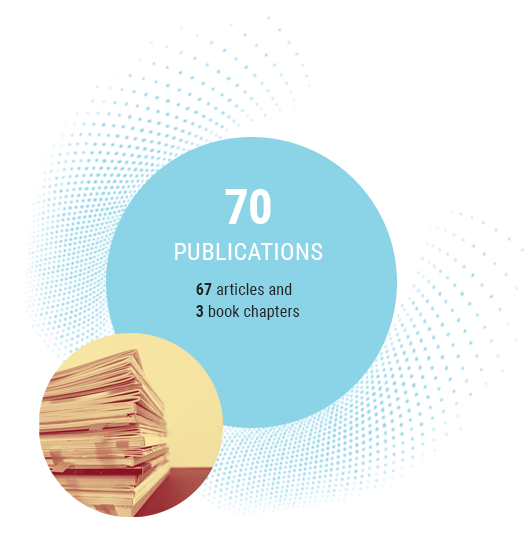 ARiEAL researchers published 66 articles and 3 book chapters in 2019. Broadly, the research topics included language learning, word recognition, syntactic features, and applications in acquired brain injury and speech-language pathology.
ARiEAL researchers published 66 articles and 3 book chapters in 2019. Broadly, the research topics included language learning, word recognition, syntactic features, and applications in acquired brain injury and speech-language pathology.
Featured below are a selection of these articles:
- Archibald, L.M., Cardy, J.O., Ansari, D., Olino, T., & Joanisse, M.F. (2019). The consistency and cognitive predictors of children’s oral language, reading, and math learning profiles. Learning and Individual Differences, 70, 230-141. https://doi.org/10.1016/j.lindif.2019.02.003.
- Shaw, S., Dhindsa, K., Reilly, J., and Becker, S. (2019). Capturing the forest but missing the trees: Microstates inadequate for characterizing shorter-scale EEG dynamics. Neural computation, 31(11):2177-2211. https://doi.org/10.1162/neco_a_01229
- Connolly, J.F., Reilly, J.P., Fox-Robichaud, A., Britz, P., Blain-Moraes, S., Sonnadara, R., Hamielec, C., Herrera-Diaz, A., & Boshra, R. (2019). Development of a Point of Care System for Automated Coma Prognosis – A Prospective Cohort Study Protocol. BMJ Open, 9(7), 1-10. https://doi.org/10.1136/bmjopen-2019-029621.
- Ho, A., Boshra, R., Schmidtke, D., Oralova, G., Moro, A., Service, E., & Connolly, J.F. (2019). Electrophysiological Evidence for the Integral Nature of Tone in Mandarin Spoken Word Recognition. Neuropsychologia, 131, 325-332. https://doi.org/10.1016/j.neuropsychologia.2019.05.031.
- Kučerová, I. (2019). On the role of person in the mapping of syntactic features onto their interpretable counterparts. Canadian Journal of Linguistics, 64(4), 649-672. https://doi.org/10.1017/cnj.2019.22.
View full list of 2019 articles
View full list of 2019 book chapters
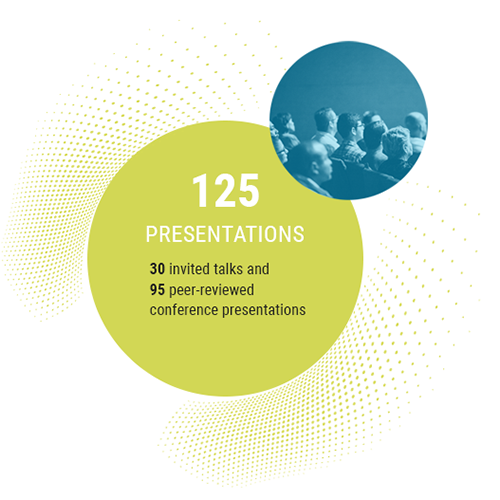 ARiEAL researchers presented 30 invited talks and 95 peer-reviewed conference presentations across several continents in 2019.
ARiEAL researchers presented 30 invited talks and 95 peer-reviewed conference presentations across several continents in 2019.
Featured below are a selection of these presentations:
- Anderson, C. & McKenny, P. (2019, July). Scaling up partnership and creating a culture of partnership. International Students as Partners Institute. Adelaide, Australia.
- Becker, S. (2019, October). Modelling the temporal dynamics of memory: from micro to macro. Annual Meeting of the Memory Disorders Research Society. New York, NY, USA.
- Kuperman, V. & Siegelman, N. (2019, August). The Multilingual Eye-movement Corpus. 20th European Conference on Eye Movements. Alicante, Spain.
- Luk, S.-H. K. & Pape, D. (2019, August). Effects of acoustic manipulation on the perceptual stability of Canadian English isolated sibilants. International Conference of Phonetic Sciences (ICPhS). Melbourne, Australia.
- Norman, R., Shah, M., & Turkstra, L.S. (2019, March). Language Comprehension after Mild Traumatic Brain Injury: The Role of Speed. The 13th World Congress on Brain Injury. Toronto, Canada.
View full list of 2019 invited and peer-reviewed presentations
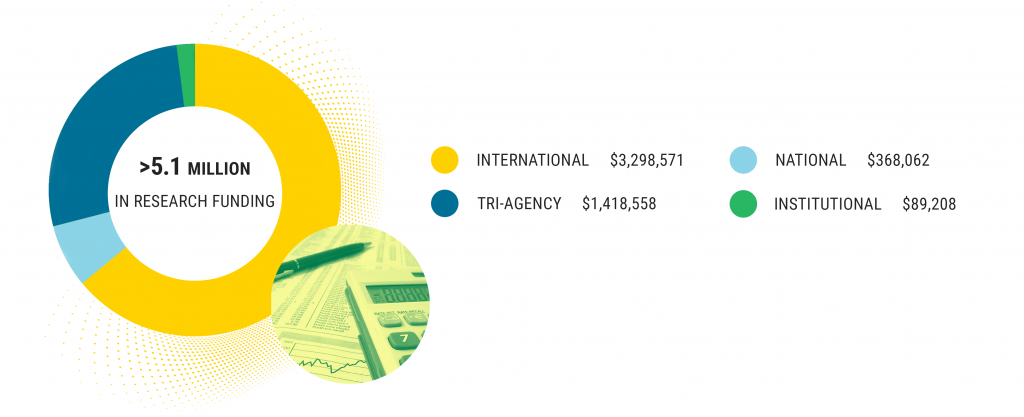 ARiEAL researchers started 15 new research grants as Principal Investigators or Co-investigators in 2019. Funding totalled over 5.1 million dollars across these newly commenced projects.
ARiEAL researchers started 15 new research grants as Principal Investigators or Co-investigators in 2019. Funding totalled over 5.1 million dollars across these newly commenced projects.
Funding sources include Canadian Institutes of Health Research (CIHR), Natural Sciences and Engineering Research Council (NSERC), National Institutes of Health (NIH), and the Canadian Foundation for Innovation (CFI), as well as various other institutions.
View full list of 2019 research grants
Impact
One of ARiEAL’s key goals is to broaden research reach and engage the global community. In 2019, we put a special emphasis on attracting curious young minds by building a youth outreach resource repertoire, which not only showcases our research excellence but also promotes active learning. Various talks and workshops were hosted in 2019 to provide opportunities for interdisciplinary, experiential, and problem-based learning for our trainees and community. Many of these are archived on our website to ensure easy access and greater knowledge dissemination.
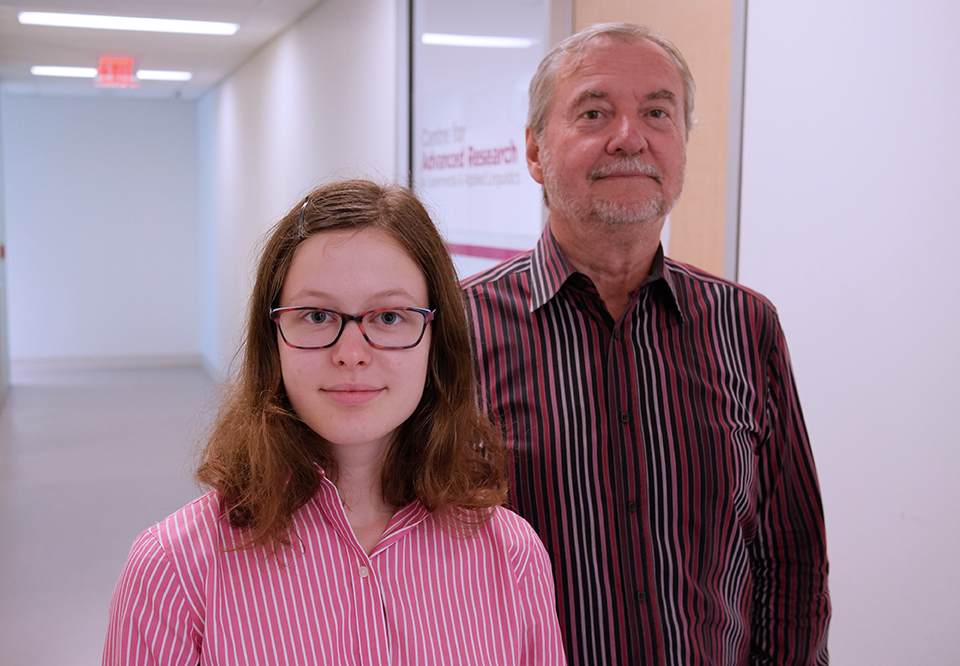
Sophie Krokhine, one of the recipients of 2019 Hamilton Health Sciences High School Research Bursary program, and her placement mentor, Dr. John Connolly. Photo by Eric Bosch.
ARiEAL aims to engage youth in the culture of research and higher education through meaningful activities. In 2019, with support from MacPherson Institute Student Partner Program, ARiEAL started building a repertoire of educational modules, which not only showcases our research excellence but also provides active learning opportunities for the visiting high school students. The goal of this youth outreach project is to establish a customizable repertoire that offers the best fit to meet the needs and interests of the visiting youth groups. This project was initiated by Dr. John Connolly and Ms. Chia-Yu Lin in May 2019 and has been an ongoing project throughout 2019 in close partnership with our student partners, Taylor Luu and Oya Pakkal, and high-school co-op student, Nolyn Lakhanpal. ARiEAL trainees were consulted in the development of the repertoire, and local high school students from SiTE Schools Dundas were consulted to ensure the effectiveness of resources. This project is expected to be completed in 2020.
Dr. John Connolly once again participated as a placement mentor in the Hamilton Health Sciences High School Research Bursary program, a highly competitive summer internship program designed for senior high school students interested in pursuing health and life science post secondary education. Sophie Krokhine, a then grade 11 student from Loretto Abbey Catholic Secondary School, completed the 7-week internship at ARiEAL in summer 2019. Sophie worked tirelessly on a literature review project with other ARiEAL trainees during the internship, and this endeavour continues into 2020 with the aim for a peer-reviewed publication. We hope more curious young minds will be inspired by the exciting research we carry out at ARiEAL, encouraging them to be part of the McMaster community one day.
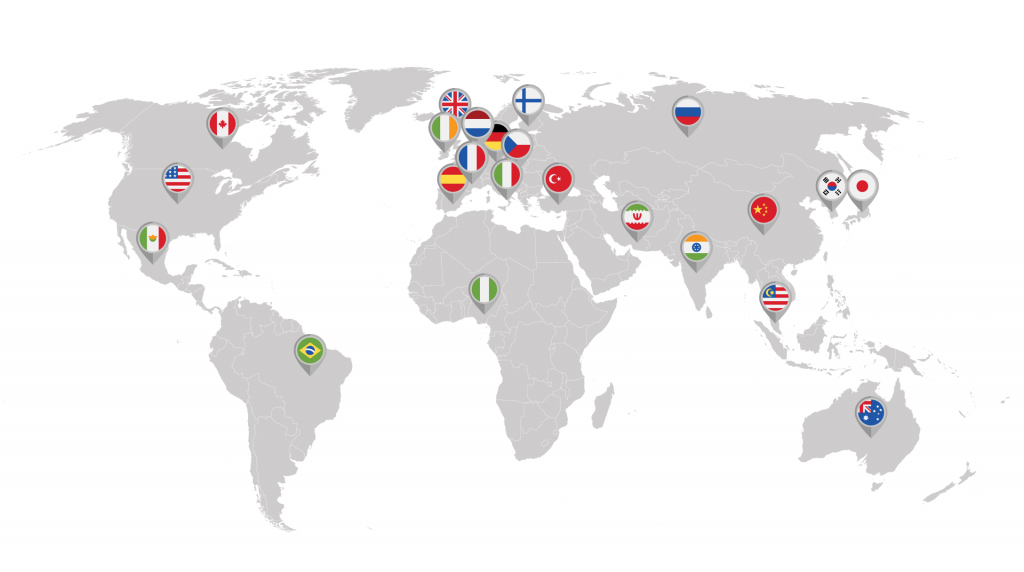
Slowly but surely, ARiEAL website attracts a consistent stream of visitors from around the world. In 2019, our website welcomed over 7,000 visitors from 92 distinct countries. This map highlighted the top 20 countries from which our website visitors come. Our official Twitter account brings the engagement to an even higher level. During the calendar year of 2019, we reached over 150,000 impressions with 365 tweets and retweets and exceeded 4,200 engagement counts. Last but not least, ARiEAL launched an Instagram account (@ariealrc) at the recommendation of the youth who participated in our outreach events. It’s a rather uncharted territory for research dissemination, but we engage with this platform in the hopes of reaching and inspiring those curious young minds!
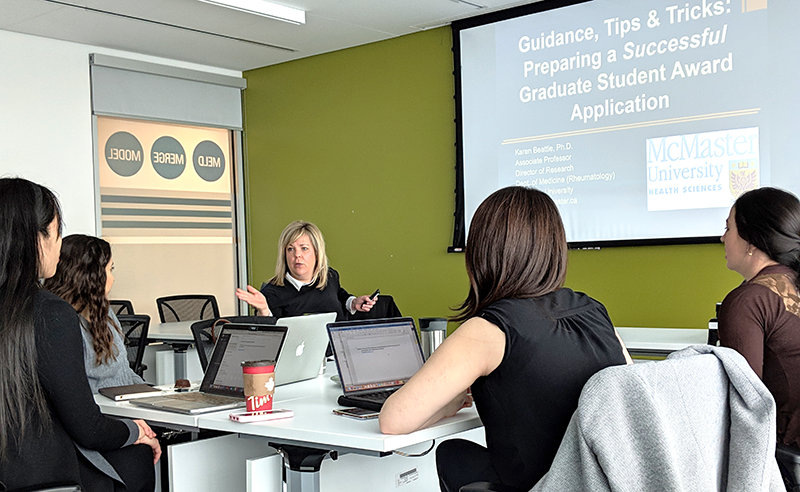
Dr. Karen Beattie shared her expertise and experience on how to prepare a successful scholarship application at ARiEAL Learning Series. Photo by Chia-Yu Lin.
ARiEAL Learning Series aims to offer various opportunities for trainees of all levels to develop and refine their research skills. We were fortunate to have the contributions of internationally renowned scholars and also our local experts. In 2019, we hosted several technical skill sessions on topics such as acoustic engineering and recording and Bayesian modeling using JAGS. A practical skill session on how to prepare a scholarship application successfully also took place at the request of our trainees.
View full list of Learning Series Sessions in 2019
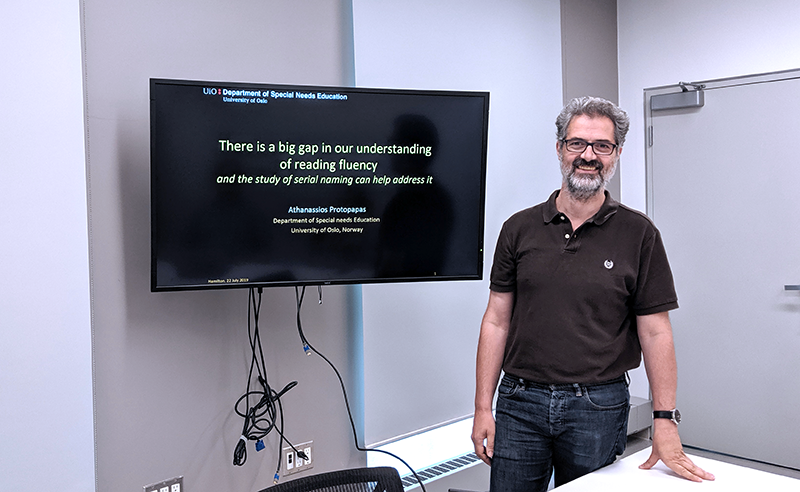
Dr. Athanassios Protopapas from University of Oslo visited ARiEAL and offered a research talk on reading fluency. Photo by Chia-Yu Lin.
While ARiEAL continues to co-host Cognitive Science of Language Lecture Series talks with the Department of Linguistics and Languages (McMaster University), a new Speaker Series specifically designed for ARiEAL’s wide-ranging research interests was established in November 2019. The goal of the ARiEAL Speaker Series is to invite renowned researchers, including ARiEAL’s very own Scientific Advisory Committee members, to share their wealth of knowledge. The interdisciplinary nature of these talks also allows ARiEAL to engage other departments or research units at McMaster University for more collaboration. Recorded Speaker Series talks are made available on ARiEAL Archive.
View full list of Speaker Series Sessions in 2019

Sophie Krokhine, one of the recipients of 2019 Hamilton Health Sciences High School Research Bursary program, and her placement mentor, Dr. John Connolly. Photo by Eric Bosch.
ARiEAL aims to engage youth in the culture of research and higher education through meaningful activities. In 2019, with support from MacPherson Institute Student Partner Program, ARiEAL started building a repertoire of educational modules, which not only showcases our research excellence but also provides active learning opportunities for the visiting high school students. The goal of this youth outreach project is to establish a customizable repertoire that offers the best fit to meet the needs and interests of the visiting youth groups. This project was initiated by Dr. John Connolly and Ms. Chia-Yu Lin in May 2019 and has been an ongoing project throughout 2019 in close partnership with our student partners, Taylor Luu and Oya Pakkal, and high-school co-op student, Nolyn Lakhanpal. ARiEAL trainees were consulted in the development of the repertoire, and local high school students from SiTE Schools Dundas were consulted to ensure the effectiveness of resources. This project is expected to be completed in 2020.
Dr. John Connolly once again participated as a placement mentor in the Hamilton Health Sciences High School Research Bursary program, a highly competitive summer internship program designed for senior high school students interested in pursuing health and life science post secondary education. Sophie Krokhine, a then grade 11 student from Loretto Abbey Catholic Secondary School, completed the 7-week internship at ARiEAL in summer 2019. Sophie worked tirelessly on a literature review project with other ARiEAL trainees during the internship, and this endeavour continues into 2020 with the aim for a peer-reviewed publication. We hope more curious young minds will be inspired by the exciting research we carry out at ARiEAL, encouraging them to be part of the McMaster community one day.

Slowly but surely, ARiEAL website attracts a consistent stream of visitors from around the world. In 2019, our website welcomed over 7,000 visitors from 92 distinct countries. This map highlighted the top 20 countries from which our website visitors come. Our official Twitter account brings the engagement to an even higher level. During the calendar year of 2019, we reached over 150,000 impressions with 365 tweets and retweets and exceeded 4,200 engagement counts. Last but not least, ARiEAL launched an Instagram account (@ariealrc) at the recommendation of the youth who participated in our outreach events. It’s a rather uncharted territory for research dissemination, but we engage with this platform in the hopes of reaching and inspiring those curious young minds!

Dr. Karen Beattie shared her expertise and experience on how to prepare a successful scholarship application at ARiEAL Learning Series. Photo by Chia-Yu Lin.
ARiEAL Learning Series aims to offer various opportunities for trainees of all levels to develop and refine their research skills. We were fortunate to have the contributions of internationally renowned scholars and also our local experts. In 2019, we hosted several technical skill sessions on topics such as acoustic engineering and recording and Bayesian modeling using JAGS. A practical skill session on how to prepare a scholarship application successfully also took place at the request of our trainees.
View full list of Learning Series Sessions in 2019

Dr. Athanassios Protopapas from University of Oslo visited ARiEAL and offered a research talk on reading fluency. Photo by Chia-Yu Lin.
While ARiEAL continues to co-host Cognitive Science of Language Lecture Series talks with the Department of Linguistics and Languages (McMaster University), a new Speaker Series specifically designed for ARiEAL’s wide-ranging research interests was established in November 2019. The goal of the ARiEAL Speaker Series is to invite renowned researchers, including ARiEAL’s very own Scientific Advisory Committee members, to share their wealth of knowledge. The interdisciplinary nature of these talks also allows ARiEAL to engage other departments or research units at McMaster University for more collaboration. Recorded Speaker Series talks are made available on ARiEAL Archive.
View full list of Speaker Series Sessions in 2019
The Centre
Founded in late 2016, ARiEAL Research Centre celebrated its third full calendar year since its inception. We are proud of the mentorship demonstrated by our members and our high-calibre trainees of all levels.
FOUNDING DIRECTOR
John Connolly (Department of Linguistics and Languages, McMaster University)
ASSOCIATE DIRECTOR
Anna Moro (Department of Linguistics and Languages, McMaster University)
FULL MEMBERS
Catherine Anderson (Department of Linguistics and Languages, McMaster University)
Sue Becker (Department of Psychology, Neuroscience & Behaviour, McMaster University)
Marc Joanisse (Department of Psychology, University of Western Ontario)
Ivona Kučerová (Department of Linguistics and Languages, McMaster University)
Victor Kuperman (Department of Linguistics and Languages, McMaster University)
Michael Noseworthy (Department of Electrical and Computer Engineering, McMaster University)
Daniel Pape (Department of Linguistics and Languages, McMaster University)
Jim Reilly (Department of Electrical and Computer Engineering, McMaster University)
Elisabet Service (Department of Linguistics and Languages, McMaster University)
Lyn Turkstra (School of Rehabilitation Science, McMaster University)
ASSOCIATE MEMBERS
Lisa Archibald (Department of Psychology, University of Western Ontario)
Carol DeMatteo (School of Rehabilitation Science, McMaster University)
Paul Grunthal (McMaster Industry Liaison Office, McMaster University)
Ranil Sonnadara (Department of Surgery, McMaster University)
POSTDOCTORAL FELLOWS
Dr. Cassandra Chapman* (Supervised by Dr. Ivona Kučerová)
Dr. Sinisa Colic (Supervised by Dr. Jim Reilly)
Dr. Félix Desmeules-Trudel (Supervised by Dr. Marc Joanisse)
Dr. Jaskiret Dhindsa (Supervised by Dr. Ranil Sonnadara)
Dr. Dobri Dotov* (Supervised by Dr. Ranil Sonnadara)
Dr. Aki-Juhani Kyrolainen (Supervised by Dr. Victor Kuperman)
Dr. Pan Liu (Co-supervised by Dr. Marc Joanisse & Dr. E Hayden)
Dr. Lien Peters (Co-supervised by Dr. Marc Joanisse & Dr. Daniel Ansari)
Dr. Daniel Schmidtke (Supervised by Dr. Anna Moro)
Dr. Paniz Tavakoli (Supervised by Dr. John Connolly)
Dr. Christina Vanden Bosch der Nederlanden (Co-supervised by Dr. Marc Joanisse & Dr. Jessica Grahn)
PHD STUDENTS
Anita Acai (Supervised by Dr. Ranil Sonnadara)
Hubert Banville (Co-supervised by Dr. Sue Becker, Dr. Alandre Gramfort, & Dr. Denis Engemann)
Taylor Bardell (Supervised by Dr. Lisa Archibald)
Rober Boshra* (Co-supervised by Dr. John Connolly & Dr. Jim Reilly)
Leah Brainin (Supervised by Dr. Marc Joanisse)
Fiona Campbell (Supervised by Dr. Lyn Turkstra)
Mohammad Chaposhloo (Supervised by Dr. Sue Becker)
Melda Coşkun (Supervised by Dr. Victor Kuperman)
Alexandra Cross (Co-supervised by Dr. Marc Joanisse & Dr. Lisa Archibald)
Ruibin Dai (Supervised by Dr. Michael Noseworthy)
Ethan Danielli (Supervised by Dr. Michael Noseworthy)
Rudaina Hamed (Co-supervised by Dr. Anna Moro & Dr. Victor Kuperman)
Adianes Herreradiaz (Supervised by Dr. John Connolly)
Constance Imbault* (Supervised by Dr. Victor Kuperman)
Aravinthan Jegatheesan (Supervised by Dr. Michael Noseworthy)
Portia Kalun (Supervised by Dr. Ranil Sonnadara)
Bre-Anna King (Supervised by Dr. Elisabet Service)
Isaac Kinley (Supervised by Dr. Sue Becker)
Alyssa Kuiack (Supervised by Dr. Lisa Archibald)
Pekka Lahti-Nuuttila (Co-supervised by Dr. Elisabet Service & Dr. Marja Laasonen)
Yarden Levy (Co-supervised by Dr. Sue Becker & Dr. Margaret McKinnon)
Chenglin Lou (Supervised by Dr. Marc Joanisse)
Sydney McQueen (Co-supervised by Dr. Carol-Anne Moulton & Dr. Ranil Sonnadara)
Christine Moreau (Supervised by Dr. Marc Joanisse)
Joel Nidel (Supervised by Dr. Marc Joanisse)
Kelly Nisbet (Supervised by Dr. Victor Kuperman)
Nicolette Noonan* (Co-supervised by Dr. Marc Joanisse & Dr. Lisa Archibald)
Gaisha Oralova (Co-supervised by Dr. John Connolly & Dr. Victor Kuperman)
Laura Pauls* (Supervised by Dr. Lisa Archibald)
Sara Pearsell (Supervised by Dr. Daniel Pape)
Paul Polak (Supervised by Dr. Michael Noseworthy)
Adam Politis (Supervised by Dr. Lyn Turkstra)
Narcisse Torshizi (Supervised by Dr. Elisabet Service)
Karen Tucker (Supervised by Dr. John Connolly)
Fareeha Rana (Co-supervised by Dr. John Connolly & Dr. Elisabet Service)
Kyle Ruiter* (Supervised by Dr. John Connolly)
Saurabh Shaw (Supervised by Dr. Sue Becker)
Edalat Shekari (Supervised by Dr. Elisabet Service)
Nicholas Simard (Co-supervised by Dr. Michael Noseworthy & Dr. Jim Reilly)
Lauren Smail (Co-supervised by Dr. Sue Becker & Dr. Ranil Sonnadara)
Bryor Snefjella* (Supervised by Dr. Victor Kuperman)
Natalie Wagner* (Supervised by Dr. Ranil Sonnadara)
Chelsea Whitwell (Supervised by Dr. Elisabet Service)
Nadia Wong (Co-supervised by Dr. Sue Becker & Dr. Hongjin Sun)
MASTER STUDENTS
Lauren Anderson (Supervised by Dr. Michael Noseworthy)
Reihaneh Ahmadi (Supervised by Dr. Lyn Turkstra)
Deewa Anwarzi (Co-supervised by Dr. Sue Becker & Dr. Sukh Obhi)
Fatemeh Armanfard (Co-supervised by Dr. John Connolly & Dr. Jim Reilly)
Leah Brainin (Supervised by Dr. Marc Joanisse)
Kurtis Commanda (Co-supervised by Dr. Ivona Kučerová & Dr. Daniel Pape)
Nathan Cupido* (Supervised by Dr. Ranil Sonnadara)
Erin De Borba (Supervised by Dr. Elisabet Service)
Maria De Los Angeles Lopez Ricote (Supervised by Dr. Elisabet Service)
Nathalee Ewers (Supervised by Dr. John Connolly)
Michael Fischer (Supervised by Prof. Carol DeMatteo)
Davide Gentile* (Supervised by Dr. Victor Kuperman)
Ashley Gilbank (Supervised by Dr. Michael Noseworthy)
Tess Hudson (Supervised by Dr. Ivona Kučerová)
Megan Karabin (Co-supervised by Dr. Ivona Kučerová & Dr. Daniel Pape)
Alish Kocz (Supervised by Dr. Ivona Kučerová)
Richard Kolesar (Supervised by Dr. John Connolly)
Nadia Kryvobok (Supervised by Dr. Victor Kuperman)
Teagan Lauriente* (Supervised by Dr. Ranil Sonnadara)
Mitchell Locke (Supervised by Dr. Michael Noseworthy)
Gwenyth Lu (Supervised by Dr. John Connolly)
Neil MacPhee (Supervised by Dr. Michael Noseworthy)
Kiersten Mangold (Supervised by Dr. John Connolly)
Allison Mizzi (Co-supervised by Dr. Sue Becker & Dr. Margaret McKinnon)
Brian McCrindle (Supervised by Dr. Michael Noseworthy)
Olivier Mercier* (Co-supervised by Dr. Daniel Pape & Dr. Elisabet Service)
Christine Moreau (Supervised by Dr. Marc Joanisse)
Leila Mousapour (Co-supervised by Dr. John Connolly & Dr. Sue Becker)
Omar Nassif (Co-supervised by Dr. Jim Reilly & Dr. Vickie Galea)
Jimmy Nguyen (Supervised by Dr. Michael Noseworthy)
Cameron Nowikow (Supervised by Dr. Michael Noseworthy)
Theresa Pham (Supervised by Dr. Lisa Archibald)
Taylor Practile* (Supervised by Prof. Carol DeMatteo)
Frederico Prado* (Supervised by Dr. Ivona Kucerova)
Natalie Romaniuk (Supervised by Prof. Carol DeMatteo)
Ethan Samson (Supervised by Dr. Michael Noseworthy)
Cindy Tran (Supervised by Dr. Ranil Sonnadara)
Meghan Vollebregt (Supervised by Dr. Lisa Archibald)
Carla Weigel (Co-supervised by Dr. Daniel Pape & Dr. Magda Stroinska)
Calvin Zhu (Supervised by Dr. Michael Noseworthy)
Sean McCarron (Supervised by Dr. Victor Kuperman)
*Completed program in 2019
MANAGER, DEVELOPMENT & RESEARCH
Chia-Yu Lin
STUDENT ASSISTANTS
Brittany Gottvald (January – April, 2019)
Taylor Luu (May – December, 2019)
Oya Pakkal (May – December, 2019)
Jessica Wood (September – December, 2019)
Dr. Laurie Feldman (University at Albany)
Dr. Denise Klein (McGill University)
Dr. Ken McRae (University of Western Ontario)
Dr. Lucie Ménard (Université du Québec à Montréal; UQAM)
Dr. Penny Pexman (University of Calgary)
Dr. Ken Pugh (Haskins Laboratories)
Dr. Sid Segalowitz (Brock University)
Dr. Jon Sprouse (University of Connecticut)
Haskins Laboratories, New Haven, Connecticut, USA
University of Turku (Department of Psychology and Speech-Language Pathology), Turku, Finland.
Words in the World (WoW), Partnership Grant funded by the Social Sciences and Humanities Research Council of Canada (SSHRC), Canada
FOUNDING DIRECTOR
John Connolly (Department of Linguistics and Languages, McMaster University)
ASSOCIATE DIRECTOR
Anna Moro (Department of Linguistics and Languages, McMaster University)
FULL MEMBERS
Catherine Anderson (Department of Linguistics and Languages, McMaster University)
Sue Becker (Department of Psychology, Neuroscience & Behaviour, McMaster University)
Marc Joanisse (Department of Psychology, University of Western Ontario)
Ivona Kučerová (Department of Linguistics and Languages, McMaster University)
Victor Kuperman (Department of Linguistics and Languages, McMaster University)
Michael Noseworthy (Department of Electrical and Computer Engineering, McMaster University)
Daniel Pape (Department of Linguistics and Languages, McMaster University)
Jim Reilly (Department of Electrical and Computer Engineering, McMaster University)
Elisabet Service (Department of Linguistics and Languages, McMaster University)
Lyn Turkstra (School of Rehabilitation Science, McMaster University)
ASSOCIATE MEMBERS
Lisa Archibald (Department of Psychology, University of Western Ontario)
Carol DeMatteo (School of Rehabilitation Science, McMaster University)
Paul Grunthal (McMaster Industry Liaison Office, McMaster University)
Ranil Sonnadara (Department of Surgery, McMaster University)
POSTDOCTORAL FELLOWS
Dr. Cassandra Chapman* (Supervised by Dr. Ivona Kučerová)
Dr. Sinisa Colic (Supervised by Dr. Jim Reilly)
Dr. Félix Desmeules-Trudel (Supervised by Dr. Marc Joanisse)
Dr. Jaskiret Dhindsa (Supervised by Dr. Ranil Sonnadara)
Dr. Dobri Dotov* (Supervised by Dr. Ranil Sonnadara)
Dr. Aki-Juhani Kyrolainen (Supervised by Dr. Victor Kuperman)
Dr. Pan Liu (Co-supervised by Dr. Marc Joanisse & Dr. E Hayden)
Dr. Lien Peters (Co-supervised by Dr. Marc Joanisse & Dr. Daniel Ansari)
Dr. Daniel Schmidtke (Supervised by Dr. Anna Moro)
Dr. Paniz Tavakoli (Supervised by Dr. John Connolly)
Dr. Christina Vanden Bosch der Nederlanden (Co-supervised by Dr. Marc Joanisse & Dr. Jessica Grahn)
PHD STUDENTS
Anita Acai (Supervised by Dr. Ranil Sonnadara)
Hubert Banville (Co-supervised by Dr. Sue Becker, Dr. Alandre Gramfort, & Dr. Denis Engemann)
Taylor Bardell (Supervised by Dr. Lisa Archibald)
Rober Boshra* (Co-supervised by Dr. John Connolly & Dr. Jim Reilly)
Leah Brainin (Supervised by Dr. Marc Joanisse)
Fiona Campbell (Supervised by Dr. Lyn Turkstra)
Mohammad Chaposhloo (Supervised by Dr. Sue Becker)
Melda Coşkun (Supervised by Dr. Victor Kuperman)
Alexandra Cross (Co-supervised by Dr. Marc Joanisse & Dr. Lisa Archibald)
Ruibin Dai (Supervised by Dr. Michael Noseworthy)
Ethan Danielli (Supervised by Dr. Michael Noseworthy)
Rudaina Hamed (Co-supervised by Dr. Anna Moro & Dr. Victor Kuperman)
Adianes Herreradiaz (Supervised by Dr. John Connolly)
Constance Imbault* (Supervised by Dr. Victor Kuperman)
Aravinthan Jegatheesan (Supervised by Dr. Michael Noseworthy)
Portia Kalun (Supervised by Dr. Ranil Sonnadara)
Bre-Anna King (Supervised by Dr. Elisabet Service)
Isaac Kinley (Supervised by Dr. Sue Becker)
Alyssa Kuiack (Supervised by Dr. Lisa Archibald)
Pekka Lahti-Nuuttila (Co-supervised by Dr. Elisabet Service & Dr. Marja Laasonen)
Yarden Levy (Co-supervised by Dr. Sue Becker & Dr. Margaret McKinnon)
Chenglin Lou (Supervised by Dr. Marc Joanisse)
Sydney McQueen (Co-supervised by Dr. Carol-Anne Moulton & Dr. Ranil Sonnadara)
Christine Moreau (Supervised by Dr. Marc Joanisse)
Joel Nidel (Supervised by Dr. Marc Joanisse)
Kelly Nisbet (Supervised by Dr. Victor Kuperman)
Nicolette Noonan* (Co-supervised by Dr. Marc Joanisse & Dr. Lisa Archibald)
Gaisha Oralova (Co-supervised by Dr. John Connolly & Dr. Victor Kuperman)
Laura Pauls* (Supervised by Dr. Lisa Archibald)
Sara Pearsell (Supervised by Dr. Daniel Pape)
Paul Polak (Supervised by Dr. Michael Noseworthy)
Adam Politis (Supervised by Dr. Lyn Turkstra)
Narcisse Torshizi (Supervised by Dr. Elisabet Service)
Karen Tucker (Supervised by Dr. John Connolly)
Fareeha Rana (Co-supervised by Dr. John Connolly & Dr. Elisabet Service)
Kyle Ruiter* (Supervised by Dr. John Connolly)
Saurabh Shaw (Supervised by Dr. Sue Becker)
Edalat Shekari (Supervised by Dr. Elisabet Service)
Nicholas Simard (Co-supervised by Dr. Michael Noseworthy & Dr. Jim Reilly)
Lauren Smail (Co-supervised by Dr. Sue Becker & Dr. Ranil Sonnadara)
Bryor Snefjella* (Supervised by Dr. Victor Kuperman)
Natalie Wagner* (Supervised by Dr. Ranil Sonnadara)
Chelsea Whitwell (Supervised by Dr. Elisabet Service)
Nadia Wong (Co-supervised by Dr. Sue Becker & Dr. Hongjin Sun)
MASTER STUDENTS
Lauren Anderson (Supervised by Dr. Michael Noseworthy)
Reihaneh Ahmadi (Supervised by Dr. Lyn Turkstra)
Deewa Anwarzi (Co-supervised by Dr. Sue Becker & Dr. Sukh Obhi)
Fatemeh Armanfard (Co-supervised by Dr. John Connolly & Dr. Jim Reilly)
Leah Brainin (Supervised by Dr. Marc Joanisse)
Kurtis Commanda (Co-supervised by Dr. Ivona Kučerová & Dr. Daniel Pape)
Nathan Cupido* (Supervised by Dr. Ranil Sonnadara)
Erin De Borba (Supervised by Dr. Elisabet Service)
Maria De Los Angeles Lopez Ricote (Supervised by Dr. Elisabet Service)
Nathalee Ewers (Supervised by Dr. John Connolly)
Michael Fischer (Supervised by Prof. Carol DeMatteo)
Davide Gentile* (Supervised by Dr. Victor Kuperman)
Ashley Gilbank (Supervised by Dr. Michael Noseworthy)
Tess Hudson (Supervised by Dr. Ivona Kučerová)
Megan Karabin (Co-supervised by Dr. Ivona Kučerová & Dr. Daniel Pape)
Alish Kocz (Supervised by Dr. Ivona Kučerová)
Richard Kolesar (Supervised by Dr. John Connolly)
Nadia Kryvobok (Supervised by Dr. Victor Kuperman)
Teagan Lauriente* (Supervised by Dr. Ranil Sonnadara)
Mitchell Locke (Supervised by Dr. Michael Noseworthy)
Gwenyth Lu (Supervised by Dr. John Connolly)
Neil MacPhee (Supervised by Dr. Michael Noseworthy)
Kiersten Mangold (Supervised by Dr. John Connolly)
Allison Mizzi (Co-supervised by Dr. Sue Becker & Dr. Margaret McKinnon)
Brian McCrindle (Supervised by Dr. Michael Noseworthy)
Olivier Mercier* (Co-supervised by Dr. Daniel Pape & Dr. Elisabet Service)
Christine Moreau (Supervised by Dr. Marc Joanisse)
Leila Mousapour (Co-supervised by Dr. John Connolly & Dr. Sue Becker)
Omar Nassif (Co-supervised by Dr. Jim Reilly & Dr. Vickie Galea)
Jimmy Nguyen (Supervised by Dr. Michael Noseworthy)
Cameron Nowikow (Supervised by Dr. Michael Noseworthy)
Theresa Pham (Supervised by Dr. Lisa Archibald)
Taylor Practile* (Supervised by Prof. Carol DeMatteo)
Frederico Prado* (Supervised by Dr. Ivona Kucerova)
Natalie Romaniuk (Supervised by Prof. Carol DeMatteo)
Ethan Samson (Supervised by Dr. Michael Noseworthy)
Cindy Tran (Supervised by Dr. Ranil Sonnadara)
Meghan Vollebregt (Supervised by Dr. Lisa Archibald)
Carla Weigel (Co-supervised by Dr. Daniel Pape & Dr. Magda Stroinska)
Calvin Zhu (Supervised by Dr. Michael Noseworthy)
Sean McCarron (Supervised by Dr. Victor Kuperman)
*Completed program in 2019
MANAGER, DEVELOPMENT & RESEARCH
Chia-Yu Lin
STUDENT ASSISTANTS
Brittany Gottvald (January – April, 2019)
Taylor Luu (May – December, 2019)
Oya Pakkal (May – December, 2019)
Jessica Wood (September – December, 2019)
Dr. Laurie Feldman (University at Albany)
Dr. Denise Klein (McGill University)
Dr. Ken McRae (University of Western Ontario)
Dr. Lucie Ménard (Université du Québec à Montréal; UQAM)
Dr. Penny Pexman (University of Calgary)
Dr. Ken Pugh (Haskins Laboratories)
Dr. Sid Segalowitz (Brock University)
Dr. Jon Sprouse (University of Connecticut)
Haskins Laboratories, New Haven, Connecticut, USA
University of Turku (Department of Psychology and Speech-Language Pathology), Turku, Finland.
Words in the World (WoW), Partnership Grant funded by the Social Sciences and Humanities Research Council of Canada (SSHRC), Canada
Produced & Designed by Brie Chauncey, Chia-Yu Lin, and Jessica Wood. Many thanks to all ARiEAL members and trainees for their contribution to this report. Special mention to Hope Morrison, Deewa Anwarzi, and Mohammad Chaposhloo for reviewing the drafts and providing edits.
L.R. Wilson Hall, Room 4020
McMaster University
1280 Main St. West
Hamilton, Ontario L8S 4K1, Canada

ARiEAL Research Centre
L.R. Wilson Hall, Room 4020
McMaster University
1280 Main St. West
Hamilton, Ontario L8S 4K1, Canada
Phone: 905-525-9140 x21032
Email: ariealrc@mcmaster.ca
Twitter: @arieal_research

